
* A Distributed Proofreaders Canada eBook *
This ebook is made available at no cost and with very few restrictions. These restrictions apply only if (1) you make a change in the ebook (other than alteration for different display devices), or (2) you are making commercial use of the ebook. If either of these conditions applies, please contact a FP administrator before proceeding.
This work is in the Canadian public domain, but may be under copyright in some countries. If you live outside Canada, check your country's copyright laws. IF THE BOOK IS UNDER COPYRIGHT IN YOUR COUNTRY, DO NOT DOWNLOAD OR REDISTRIBUTE THIS FILE.
Title: Urbanities: Essays New and Old
Date of first publication: 1921
Author: E. V. (Edward Vevrall) Lucas
Date first posted: Mar. 25, 2017
Date last updated: Mar. 25, 2017
Faded Page eBook #20170339
This ebook was produced by: David T. Jones, Cindy Beyer & the online Distributed Proofreaders Canada team at http://www.pgdpcanada.net

URBANITIES
OTHER WORKS BY E. V. LUCAS
Rose and Rose
Verena in the Midst
The Vermilion Box
Landmarks
Listener’s Lure
Mr. Ingleside
Over Bemerton’s
London Lavender
Specially Selected
Cloud and Silver
A Boswell of Baghdad
’Twixt Eagle and Dove
The Phantom Journal
Loiterer’s Harvest
One Day and Another
Fireside and Sunshine
Character and Comedy
Old Lamps for New
The Hambledon Men
The Open Road
The Friendly Town
Her Infinite Variety
Good Company
The Gentlest Art
The Second Post
A Wanderer in Paris
A Wanderer in Holland
A Wanderer in Venice
A Wanderer in Florence
A Wanderer in London
London Revisited
Roving East and Roving West
Highways and Byways in Sussex
Anne’s Terrible Good Nature
The Slowcoach
The British School
E. A. Abbey, R.A.: His Life and Work
Vermeer of Delft
The Life of Charles Lamb
and
The Pocket Edition of the Works of Charles
Lamb: i. Miscellaneous Prose; ii. Elia;
iii. Children’s Books; iv. Poems and
Plays; v. and vi. Letters

URBANITIES
ESSAYS NEW AND OLD
BY
E. V. LUCAS
WITH
A PICTORIAL COMMENTARY
BY
G. L. STAMPA

METHUEN & CO. LTD.
36 ESSEX STREET W.C.
LONDON
First Published in 1921
| PAGE | |
| THE RING | 1 |
| THE FATHERLY FORCE | 11 |
| OF ACCURACY | 21 |
| A LITTLE CHILD | 29 |
| TRANSFORMATION | 37 |
| THOSE THIRTY MINUTES | 43 |
| THE FREE PLEASURES | 49 |
| THE BEAUTIFUL WORDS | 56 |
| ON BEING SOMEBODY ELSE | 60 |
| SENSES AND SENSIBILITY | 66 |
| A STUDY IN SYMMETRY | 69 |
| SOME OF OUR CONQUERORS | 75 |
| THE OLD COUNTRY | 81 |
| INNOCENCE AND IMPULSE | 96 |
| ROMANCE WHILE YOU WAIT | 101 |
| POSSESSIONS | 106 |
| THE CABMAN AND THE COIN | 113 |
| THE OTHER TWO | 118 |
| DRAKE AND HIS GAME | 124 |
| THE TWO PERKINSES | 130 |
| CONCERNING RARITIES | 142 |
| MY FRIEND FLORA | 147 |
| CLICQUOT WELL WON | 154 |
| THE DOUBLE | 162 |
| ON EPITAPHS | 167 |

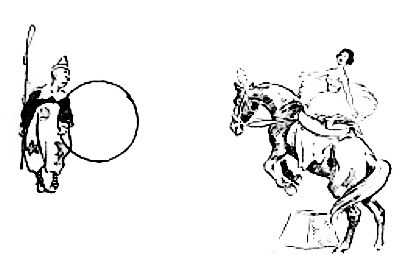
DIFFERENT persons would have different thoughts as they read the title of this essay. A romantic girl might visualise a diamond or a sapphire, or, if she were without superstition (but she isn’t), an opal; a musician might think of Wagner; and a devotee of the Fancy, of Carpentier or Jimmy Wilde. But when I set the words down I had only the circus in mind. The ring is, to me, the circus ring, that round space, forty-two feet in diameter, enclosed in a red-baized rim and covered with tan, which to all simple-minded creatures symbolises a section at any rate of the terrestrial paradise.
I say simple-minded; and nothing so convinces me of the wrongness of the world as the fact that the circus is under a cloud, while in London there is no circus at all. In this vast city, with its toiling, moiling millions, there is not one honest ring. You may (except at Christmas) range from Shepherd’s Bush to East Ham, from Sydenham to Hampstead Heath, and find no building bright with light and happy with laughter, where horses with backs of an astounding flatness amble, and equestriennes pirouette and leap and bewitch, and clowns affect to help with the carpet but only hinder, and acrobats dazzle by their intrepidity and address. For scores and scores of years London was never without a permanent circus, and to-day there is none. But how gladly the Londoner would welcome one is proved at Christmas, when both Olympia and the Crystal Palace become human again.
In Paris there are permanent circuses. I was at one the other day—the Medrano—which is sacred to the innocent drolleries of those three beneficent brothers, the Fratellini. Whenever I go to Paris I seek the company of the Fratellini, and enjoy it. They never fail me. The fact that they are always there and always popular (every night in the week, including Sundays, and at three matinees) while we have no clowns left, goes to prove how much simpler-minded are the French than ourselves. And yet the Parisians are supposed to be more sophisticated than we!
But, of course, in reality they are not so. We English sometimes grow up, but the French never do. If they did Paris would not support always two, and sometimes four, circuses, nor would they take the delight that they do in the fairs that are continually interrupting the traffic and rending the air with whistles and waltzes in each arrondissement in turn. I was in Paris on the night when the fête de Montmartre began, and I watched spellbound the parties of pleasure-seekers, and envied them their enthusiasm and uncomplicated joy. They were of all ages and they could not be satiated. Especially did they love the roundabouts. They were whirled on the backs of horses, on the backs of cows, but particularly on the backs of pigs; they were flung from side to side in great copper casseroles, which had a double movement, revolving eccentrically both around the steam organ and on axes of their own. What, I wondered, is the special attraction for the simple-minded that the process of revolution holds: the harmless revolution of the roundabout and the circus ring. For the complex, the theatre, the progress of dramatic events; but for the simple, the child-like, mere circulation can suffice.
The difference between the simple soul and the elaborate is largely this: that the simple soul is satisfied with the same, but the elaborate wants change. A little girl that I know, when she is offered a new book, asks to have a certain old one read to her again: either she never tires of this story, or she is fearful that the new one may be inferior to it. Similarly, the French, for all their big black beards, never tire of the fair or of the circus—the great value of the circus being its dependable antiquity, its veneration for tradition. In the circus you know what to expect, and you get it. You know, for instance, that one of the clowns will pursue his hat, eternally kicking it just out of reach. If he failed to do this your heart would be broken! In London we now prefer the cinema, and we are so sophisticated and unsimple, such gluttons for novelty, that the cinema has to be continually changing.
I do not want to set up comparisons; besides, I am increasingly a believer in the rhythm of life, and feel secure in my mind that there will be another of the periodical returns to nature, when the circus will come to its own again; but one cannot blind one’s eyes to the fact that the cinema is a far less healthy taste. The cinema is mechanism, it is witnessed under insanitary conditions, and it traffics at fourth hand in counterfeit emotions. On the stage the emotions are only at third hand, but one does at least see and hear the actual persons who pretend to them; who, as well as they can, carry out the author’s idea of how real people would have behaved. But the cinema can offer only the photographs of the performers who pretend to feel the emotions that the author fancies would have animated real people. This is remote indeed! I am not attacking the cinema; it has given me far too much pleasure for me to be so ungrateful as that; but I am also not, I hope, in danger of committing the fault of over-rating it.
The circus has more positive virtues. The circus is open and light. The entertainment is at first hand and calls on high qualities of strength and restraint and skill. Any picturesque debauchee can cut a presentable figure on the films, but a circus artiste has to keep in training. The spectacle of an athlete in the ring is salutary to the young. For centuries it has been so: the weight of the ages is behind it. I like, too, the thought that the circus which one is visiting is in every respect unique. Only those present are the witnesses of it, whereas the same cinema story is being followed at the same time by people all over the world, and even the same play can be performed by many companies simultaneously. It is true that other beautiful ladies may be leaping at this moment through tissue paper hoops in Rome, in Baltimore, in Godalming, in Adelaide, and in Stockholm, but they are different hoops, and the lady, though like, is different too. This lady is ours and ours alone. But the same photograph of Charlie Chaplin is, at this moment, evoking shouts of laughter in all those and hundreds of thousands of other cities and towns and even villages, wherever a picture palace exists. In other words, the circus offers us preferential treatment.
It is, however, the candour of the ring, its open healthiness, the honest fun of it, the high athletic standards of it, that are its greatest and most radiant merits. Whatever else London may lack, a wise administrator would see to it that there was always a circus in its midst. It would be better for us than much legislation.
Those astute fellows, the managers—but they are not really astute: I know several; they only affect to be—will open circuses again directly they feel that the time is more than ripe; but if I were a millionaire I should open one at once, just to see how many pure souls London numbers. More, very likely, than the professional popularity-assayers suppose. Why, I can think of several as I write. There is, well, there is myself, for one. And—well, I won’t trouble you with all the others just now, but there is the boy who cleans the boots at my friend’s house at Thames Ditton. A little while ago the angel visitant, Lord George, pitched his tent in that neighbourhood for a night or so, and the boy was asked if he would like to go. Would he like to go! The morning after found him still in a semi-trance of delight. He was questioned as to what he had most enjoyed. He had most enjoyed seeing something which he had heard about all his life (thirteen long years, if you please), but had feared he never might see: a lady on horseback jumping through hoops. And, of course, when you come to think of it, that is the circus crystallised—a lady jumping through hoops: young, lovely, incomparably and inimitably gifted, dressed in gauze, riding a charger with the negligence of mastery, distributing smiles and jumping through hoops. It is coloured representations of her in this feat that are chosen to advertise the circus, while pictures of elephants and clowns languish in the billposter’s cellar. It is she herself who ever since the days of Nero has lured younger sons to become circus camp followers; even so cool and cynical a youth as the late Henry Labouchere could take service in an American show for her sake!
Being a millionaire, I should be able to afford a loss, but I doubt if there would be one. And then, if my guess were correct and the pure souls rolled up in their thousands, how the astute managers would fall over each other to build rival circuses and over-do the whole thing! For that is their way. Meanwhile, having no money of my own, I am hoping that these lines may chance to attract the eye of some war profiteer who needs a little guidance as to the expenditure of his. Surely among that mighty host there must be one who remembers what a circus meant to him, in those distant days when he was still innocent, and would like such rapture as he knew then to be shared now by others, with the chances of a dividend for himself thrown in? If he will come forward and buy a site and get to business and is in need of a literary fellow to suggest a name for the new circus and generally keep his heart up, he has only to apply to me and I will do it all for love.
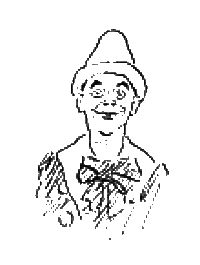
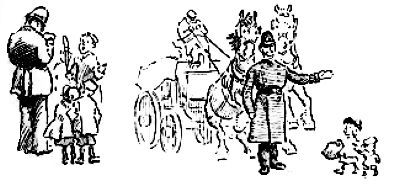
LONDON may be “the stony-hearted step-mother” that De Quincey called her, but we Londoners are not necessarily neglected orphans because of that. So long as one policeman remains, we shall never be fatherless.
If I were the sisters Taylor of Ongar I should put the following questions into melodious and easily-memorised verse. Who is it, when we are lost, that tells us the way, always extending an arm as he does so? The policeman. Who is it that knows where the nearest chemist’s is? The policeman. Who, when we are in danger of being run over if we cross the road, lifts a hand like a York ham and cleaves a path for us? The policeman. At night, when we have lost the latch-key, who is it that effects an entrance (I borrow his own terminology) through a window? The policeman. The tale of his benefactions is endless.
Two American girls recently in London spent much of their time in pretending to an ignorance of the city, entirely (they confessed) in order to experience the delight of conversing with constables; and a lady once told me that the nicest men she had ever met (and her incorrigible carelessness forced her to see them almost once a week) were the policemen in the Lost Umbrella Office on the Embankment. I believe it. I have the same feeling when I go there, and it bewilders me, remembering these fascinating officials, to think that the Foreign Office ever has any difficulty in appointing Ambassadors. Yet these too, with all their sympathy and suavity and sweet reasonableness, are policemen au fond. For the dark blue uniform is very powerful, and every man who dons the white worsted glove finds his hand turning to iron beneath it. Whatever he may have been before the Force absorbed him, he will henceforward side with order against disorder, with respectability against Bohemianism, with sobriety against vinous jollity.
And yet the policemen make their allowances. I watched four of them the other day frog-marching a very “voilent” (as they always say in their evidence the next morning) reprobate from Burleigh Street to Bow Street. During the struggle he distributed some vicious kicks, but I could not determine by the constables’ attitude, though they would, no doubt, have preferred a more tractable captive, that they felt any grudge towards him, or thought him any worse than a meeker delinquent.
Although in real life the policeman is so monumentally respectable and solid, on the stage he is never anything but comic. A Kiss for Cinderella to some extent qualified this assertion; for the constable there with the “infalliable” system was romantical as well. But, generally speaking, a policeman’s part is a comic part, and must be so. Tradition is too strong for anything else. Too many clowns in too many harlequinades have wreaked their mischievous will on him. Hence, whatever the play, directly we see him we begin to laugh; for we know that though the uniform is honourable, the voice will be funny. But in real life the police are serious creatures, while during the first three days of Armistice week, when they had to stand by and watch all kinds of goings-on for which no one was to be whopped, they were pathetic, too. Seldom can they have been so unhappy as when the bonfire was burning in the middle of Cockspur Street, and nothing could be done, or was permitted to be done.
London, I maintain, has few sublimer sights than a policeman doing his duty. I saw one yesterday. Hearing a warning call and a crash, I was at the window in time to see an omnibus and a small wagon inextricably mixed, and to watch with what celerity a crowd can assemble. But it was not that which drew the eye; it was the steady advance, from a distant point, of one of our helmeted fathers. He did not hurry: nothing but pursuit of the wicked fleeing makes a policeman run; but his onset was irresistible. Traffic rolled back from him like the waters of the Red Sea. When he reached the scene of trouble, where the motor-driver and the driver of the wagon were in ecstasies of tu quoque, while the conductor was examining the bonnet for damage and the passengers were wondering whether it was better to wait and work out their fares or change to another bus—when he reached the scene of trouble, he performed an action which never fails to fascinate me: he drew forth his pocket-book. There is something very interesting in the way in which a policeman does this. The gesture is mainly pride, but there is misgiving in it, too: the knowledge that the pen is not as mighty as the truncheon. But the pride is very evident: the satisfaction of Matter being seen in association with Mind, like a voter whose hand has been shaken in public by a titled candidate. Policemen, as a rule, are laborious writers, and this one was true to type, but there is none that comes nearer the author of the Book of Fate. What a policeman’s moving finger writes, goes, as the Americans say.
One of the best stories of the fatherliness of the Fatherly Force that I ever heard was told to me by that elvish commentator on life, and most tireless of modern Quixotes, the late Robert Ross. He brought it, oddly enough, from Russia, and, when I urged him to write it, with characteristic open-handedness he presented it to me.
The heroine was a famous member of the Russian Imperial Ballet who, though she had not then danced in London—her genius being too precious in her own country—had been here unprofessionally as a sight-seer; and it was here that the adventure which is the foundation of this narrative befell. From her own lips, at a supper party in Moscow, Ross had the tale, which now, but lacking all his personal enrichments, I tell again.
The dancer when in London had witnessed one of our processions: the opening of Parliament, the Lord Mayor’s Show—I can’t say what—and she had found herself at a disadvantage in the crowd. It is unusual for premières danseuses to be tall, even when they are poised on the very tips of their conquering toes; and this lady was no exception. The result was that she could not see; and not to be able to see is for any woman a calamity, but for a foreign woman a tragedy: particularly so when she is in her own country a queen, accustomed to every kind of homage and attention. The ballerina was at the height of her despair when one of the policemen on duty took pity on her, and lifting her in his arms held her up long enough to enjoy the principal moments of the pageant. From that day onwards, she said, the London policeman was, for her, the symbol of strength and comfort and power. Gigantic Cossacks might parade before her all day, but her true god out of the machine was from Scotland Yard. . . .
A time came when, to the grief of her vast public, she fell ill. The Tsar’s own physicians attended her, but she became no better, and at last it was realised that an operation was inevitable. Now, an operation is an ordeal which a première danseuse can dread with as much intensity as anyone else, and this poor little lady was terrified. Empresses of the ballet should be free from such trials. No, she vowed, she could never go through with it. Never. The idea was too frightening.
“But,” said the first physician, “you must. It will only be a slight affair; you will come out of your convalescence better than before.”
“Yes,” said the second physician, “and more beautiful than before.”
“And,” urged the third physician, “more popular than before.”
“And,” added the surgeon, “you will live for ever.”
But she still trembled and refused. . . . It was impossible, unthinkable. . . .
What then?
Well, let me say at once that, as a matter of fact, she underwent the operation with perfect fortitude, and it was a great success. But how do you think she brought herself to face it? Only by tightly holding the white gloved hand of a specially constructed doll of massive, even colossal, proportions, dressed in the uniform of a London policeman.
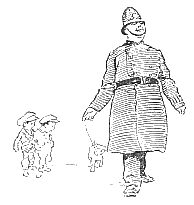
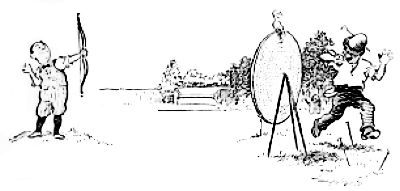
OPENING recently one of the great frivolous illustrated weeklies: those papers in which, by reading from left to right, one identifies footlight favourites and peers’ second sons—opening one of these, I came upon a page of ladies of the chorus with whom by a singular chance (for I am not naturally much entangled by the stage) I have some slight acquaintance. For circumstances having conspired to lure me into one of the many avenues which lead to or branch from the Temple of Thespis, I had been much occupied too in the composition of what with excessive lenience Mr. Crummles calls “lyrics”. By this term, which to me has always meant something rather sacred, a joyful or passionate expression of emotion or ecstasy, associated with such names as Shakespeare and Herrick, Shelley and T. E. Brown, Campion and Lovelace, Mr. Crummles means any and every assemblage of words set to music and sung by young ladies to audiences. I never hear my own efforts in this line called lyrics without blushing; but “lyric” being the accepted phrase, just as “comedy,” that fine term, is the accepted phrase for all forms of dialogue intended to remove gravity, protest is foolish. Those who are so temerarious as to accept invitations to Rome must adopt Rome’s vocabulary. Looking then upon the page of my new friends in the frivolous weekly illustrated paper, I was shocked and horrified to discover that out of some eighteen there portrayed, only a small proportion were accurately named. The names were right, but they were associated with the wrong photographs, or, if you prefer it, the photographs were right, but they were associated with the wrong names.
See how many persons that careless sub-editor has disillusioned by his happy-go-lucky methods! For it is not only I, who do not really matter, but all those dainty-toed, festivous ladies wrongly named who have been rendered sceptical. Rightly named, they would have been plunged into delight, together with their relations, their friends, and their “boys”; but as it is, all these good people are now profoundly impressed by the untrustworthiness of the weekly illustrated press, and in grave doubt as to the bonâ fides of the daily illustrated press too. Imagine the feelings of the mother—or, if you will (for you are so desperately romantic), the fiancé—of Miss Trottie Demury when she (or he) sees under the picture the name of Miss Birdy Dupois. For Miss Demury is beautiful, whereas Miss Dupois——And then imagine the feelings of the mother or fiancé of Miss Dupois on finding that under her picture is the name of Miss Cussie Roe. For Miss Dupois is beautiful, whereas Miss Roe——And so it goes on. All these good people are, I say, not only hurt, disappointed, and surprised, but made permanently sceptical.
There is too much unbelief in the world for so many of us thus suddenly to augment the great army of doubt. But how can we help it? Speaking personally, this regrettable occurrence has undermined my confidence not only in that particular number of the paper but in every issue of it that I have ever seen. If on the only occasion when I have special knowledge I am thus deceived, how can I continue to believe in any other statement? All the thrills imparted to me by gazing in earlier numbers on the ivory smile of Miss Dymphna Dent may have been wasted. Those too numerous languorous half-lengths were probably not Mlle. Lala Ratmort at all. Nor am I perhaps acquainted with the lineaments, as I thought I was, of either Count De Spoons, the famous collector of old silver, or Mrs. Debosh-Tinker, the beautiful and popular new hostess. And those fine young fellows who used to figure week by week in the melancholy Roll of Honour—they may have often been misnamed too. So you see what it is to have one’s faith shattered.
Has any reader of these words, I wonder, ever found perfect accuracy in the newspaper account of any event of which he himself had inside knowledge? Something always is wrong; often, many things are wrong. Where, then, is accuracy to be found? Where is truth? As the modern Pilate might ask, Is there such a thing as truth absolute?
My experience of truth is that it is granular and not solid; a kind of dust or powder. Every one of us has some grains of it; but some have more than others, and some esteem the material more highly than others. When the Psalmist said “All men are liars,” he was understating the case; in his leisure he would have added, “And all men are truth-tellers”. It is almost impossible to keep truth out; no one can consistently suppress it. It crops up everywhere, even in the most unlikely places. Deliberate false witness can be full of it. I believe that every written sentence, every spoken sentence, is almost bound to contain a grain or so, even when the speaker or writer is trying hard to lie; and when the words are spoken in anger, the grains are apt to be numerous. Human nature is so complex and contradictory that practically everything that can be said of anyone has some truth in it. But when it comes to truth absolute and unqualified—not Diogenes with a searchlight could find that.
As one grows older one grows increasingly suspicious, not only of other people’s testimony, but of one’s own. Memory plays strange and stranger tricks; hearing is less exact; vision becomes defective. Once upon a time I would state a thing with emphasis, and stick to it. Now I state a thing with hesitancy, and when the question is put to me, “Are you sure about that?” I abandon the position instantly. “No,” I say, “I am not sure. I am no longer sure about anything in the world except that death some day is coming.”
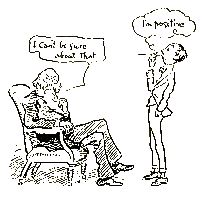

THE decision that the governess-cart must be given up meant that a new owner for Polly must be found.
Polly is a roan pony, and she had been with us (this is my neighbour’s story, not mine: a very charming neighbour who keeps her temper at croquet)—Polly had been with us so long as to become, as ponies peculiarly can, a member of the family, so that to part with her savoured of treachery. Necessity, however, knows no law and nourishes no memory, and the distasteful preparations were therefore begun.
The first was the framing of the advertisement; which is not the simple matter that it might appear to be, because so much depends upon the choice of adjective. The selected word must both allure and (in our case) keep within the bounds of truth. What are the qualities most valued in a pony, we had to ask ourselves. Celerity? Polly was fixed in her determination not to exceed the speed limit, at any rate on outward journeys. Willingness? Polly could be desperately stubborn. Strength? Yes, she was strong. Youth? Well, she came to us ten years ago and she was no foal then. After much serious deliberation, compared with which Versailles Conferences are mere exchanges of persiflage, it was decided to describe Polly either as “strong useful pony” or “useful strong pony”. Further deliberations fixed the phrase as “Pony, strong, useful,” and the advertisement was dispatched to the local rag, as our very worthy county chronicle is too often called.
Next came the question of what price was to be asked. Here expert opinion was resorted to, in the shape of Mr. Edmead, the butcher. No one knows more about ponies than butchers do, and Mr. Edmead is exceptionally wise.
“Taking everything into consideration,” he said, “I think that twenty-five pounds would be a fair price.”
We clung to each other for support. Twenty-five pounds! And we had given only nine pounds all those years ago. Why had we not made pony-breeding a hobby? The War, Mr. Edmead went on to explain, had rendered ponies more valuable. Yes, taking everything into consideration, twenty-five pounds was a fair price. We ought to get that. In fact, if he had been in need of a pony he would have given that himself; but just then he was well supplied, and Polly was, he feared, not quite fast enough for him. Good morning.
Men who want to buy a pony have a strong resemblance to each other. They are clean-shaven and wear hard round hats, and the collars of their overcoats are carelessly treated so that they are half up and half down. They carry sticks. Also, although they want a pony, they don’t want one at quite such a figure. All the men who came to see Polly were furthermore alike in agreeing that she was no doubt a useful strong pony, even a strong useful pony, but she was not for them. Day after day Polly was examined. They opened her mouth and shook their heads, they felt her knees and her hocks, they looked at her with narrow eyes from near by and from far, they rattled their sticks in their hard hats, they gave her sudden cuts and prods. But they didn’t buy.
We began to get desperate. Much as we esteemed Polly, now that she was to be sold we wanted to be rid of her. Things should be done quickly. And then came a market gardener, a large, rubicund, genial man named Fox. And Polly was again led forth and again subjected to every test known to pony-buyers. All was going well, and would have gone well, but for Vivian. Who, you ask, is Vivian, what is he? Vivian is a small boy who had known Polly intimately all his life, and who by some mischance wandered out from his lessons in the morning-room at the precise moment when Mr. Fox, who obviously was attracted by Polly, was making up his mind to pay the full money. Vivian, I should explain, is one of those ingratiating little boys who look upon the world as a sphere existing solely to provide them with friends, and who attach themselves with the strongest bands to open-air manual labourers. No sooner did Vivian see Mr. Fox’s benevolent features than he added him to his collection.
“Run away, Vivian,” I said. “It’s not play-time yet, and we’re busy.”
“Are you going to buy Polly?” Vivian asked Mr. Fox by way of a suitable rejoinder to my command.
“I was thinking about it,” said Mr. Fox, adding to me, “How old do you call her, ma’am? She looks to me about twelve.”
The figure was so low that I nodded assent, but Vivian spoilt it by exclaiming, “Oh, mother, and Mr. Brooks says she’s seventeen if she’s a day; and I’m sure she’s a day.”
Mr. Fox became thoughtful. “Mr. Brooks said that, did he?” he remarked.
I felt that I couldn’t tell Vivian again to go in, because it would look as though I feared his frankness; which, to be candid, I did. All I could do was to hope for the best.
“She’s quiet enough; used to traffic and all that?” Mr. Fox asked.
Then Vivian began to laugh. This trick of laughter over retrospection—chewing the cud of old jokes—we have always rather admired in him; his chuckles are very engaging; but now I trembled, and not without reason.
“Don’t you remember, mother,” he began, “that day when she was frightened by the traction engine and ran into the grocer’s shop?”
Mr. Fox, in whose large hand my son’s minute one was now reposing, looked grave.
“That’s against her in my business,” he said.
“Oh, but,” I explained, “that was a very long time ago. She’s quite steady now. Don’t you remember, Vivian, it was on your fifth birthday?”
“No,” said Vivian, “that was on my seventh birthday—something funny always happens on my birthdays,” he explained to Mr. Fox—“it was on my fifth birthday that Polly fell down.”
“She’s been down, has she?” said Mr. Fox ominously.
The rest of it is too tragic. I had no intention of concealing anything; Mr. Edmead knew the pony’s whole history when he valued her; but Vivian’s presence made me nervous, painfully self-conscious; I felt my face burning and knew that I must be crimson.
Mr. Fox, I will admit, played the game. He asked Vivian no questions; indeed, he talked of other things than defective ponies; but I could see his mind working; I could see pound after pound dropping away from the grand total.
Well, that’s the story. Mr. Fox led Polly away some ten minutes later, leaving in her stead a cheque. But it was not for twenty-five pounds—Vivian saw to that.
The moral? The moral is: when your husband is in Mesopotamia and the time comes to sell the pony, lock your cherubic offspring in the nursery.

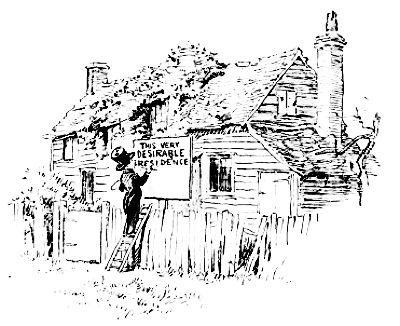
MY house, which I am trying to let, is a modest little affair in the country. It has a small meadow to the south and the road to the north. There are some evergreens about the lawn. The kitchen garden is large but most indifferently tended; indeed, it is partly through dissatisfaction with a slovenly gardener that I decided to leave. The nearest town is a mile distant; the nearest station two miles and a half. We have no light laid on except in a large room in the garden, where acetylene gas has been installed.
I am telling you these facts as concisely as I told them to the agent. He took them down one by one and said, “Yes”. Having no interest in anything but the truth, I was as plain with him as I could be.
“Yes,” he said, “no gas anywhere but in garden-room.”
“Yes, small paddock, about two acres, to the south.”
“Yes, one mile from nearest town.”
I was charmed with his easy receptivity and went away content.
A few days later I received the description of the house which the agent had prepared for his clients. Being still interested in nothing but the truth, I was electrified.
“This very desirable residence,” it began. No great harm in that.
“In heart of most beautiful county in England,” it continued. Nothing very serious to quarrel with there; tastes must always differ; but it puts the place in a new light.
“Surrounded by pleasure-grounds.” Here I was pulled up very short. My little lawn with its evergreens, my desolate cabbage-stalks, my tiny paddock—these to be so dignified! And where do the agents get their phrases? Is there a Thesaurus of the trade, profession, calling, industry or mystery? “Garden” is a good enough word for any man who lives in his house and is satisfied, but a man who wants a house can be lured to look at it only if it has pleasure-grounds: is that the position? Does an agent in his own home refer to the garden in that way? If his wife is named Maud does he sing, “Come into the pleasure-grounds”?
“Surrounded,” too. I was so careful to say that the paddock and so forth were on one side and the road on the other.
I read on: “Situated in the old-world village of Blankworth”. And I had been scrupulous in stating that we were a mile distant—situated in point of fact in a real village of our own, with church, post-office, ancient landau, and all the usual appurtenances. And “old world”! What is “old world”? There must be some deadly fascination in the epithet, for no agent can refrain from using it; but what does it mean? Do American agents use it? It could have had no attraction for Columbus. Such, however, is the failure of our modernity that it is supposed to be irresistible to-day. And “village”! The indignation of Blankworth on finding itself called an “old world village” will be something fierce.
None the less, although I was amused and a little irritated, I must confess to the dawnings of dubiety as to the perfect wisdom of leaving such a little paradise. If it had all this allurement was I being sensible to let others have it? Had I not perhaps been wrong in my estimate? Was not the sanguine agent the true judge?
I read on and realised that he was not. “One mile from Blankworth station.” Such a statement is one not of critical appraisement but of fact or falsity. The accent in which he had said, “Yes, two and a half miles from the station,” was distinct in my ear.
I read further. “Lighted by gas”; and again I recalled that intelligent young fellow’s bright “Yes, gas only in the garden-room”.
What is one to do with these poets, these roseate optimists? And how delightful to be one of them and refuse to see any but desirable residences and gas where none is!
But it was the next trope that really shook me: “Well-stocked kitchen-garden”. Here I ceased to be amused and became genuinely angry. The idea of calling that wilderness, that monument of neglect, “well-stocked”. I was furious.
That was a week ago. Yesterday I paid a flying visit to the country to see how things were going and how many people had been to view the place; and my fury increased when, after again and for the fiftieth time pointing out to the gardener the lack of this and that vegetable, he was more than normally smiling and silent and dense and impenitent.
“You say here,” he said at last, pulling the description of the house from his pocket and indicating the words with a thumb as massive as it is dingy and as dingy as it is massive—“you say here ‘well-stocked kitchen-garden’.”
I pointed out that it was not I who said it.
“Well, I don’t know who it was exactly,” he replied, “but you allow it to be said.”
Which was true.
And now I understand better the phrases, “agents for good” and “agents for evil”.

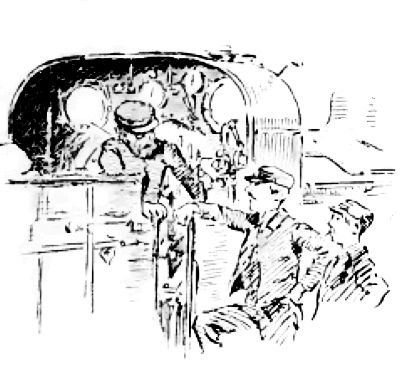
THERE are many things that children should be taught, in addition to those in the curriculum; and one of the first is not to hang about seeing people off by train.
Then such episodes as this, which are being enacted on railway platforms all over England every day, would no longer be possible.
Scene: Victoria.
The train for Brighton is in and already full, although half an hour has yet to go. In a first-class compartment intended for six are ten persons, among them a meek girl squeezed between two Lieutenants, who have lifted the padded arms dividing the seats. Outside at the window is the meek girl’s friend, an elderly woman, who has come to see her off. They have nothing to say to each other; but the friend cannot tear herself away. The other passengers hate the sight of her.
Elderly Woman. Well, take care of yourself.
Meek Girl. Yes.
[A minute passes, during which, as in all the subsequent minutes, the friend beams through the window.
E. W. Are you cramped in there?
M. G. (who can hardly breathe for Lieutenants). Oh no, not at all.
E. W. You look as if you were.
[The Lieutenants make insincere efforts to release her a little.
M. G. Oh no, not at all really.
[A minute passes.
E. W. It’s lucky we were here early.
M. G. Yes, isn’t it?
[Time passes.
E. W. I wonder if you’ll stop at Croydon.
M. G. I wonder.
E. W. Probably not. I expect this is an express.
[More time passes.
E. W. Shall I get you a paper?
M. G. No, thank you.
[Another interval.
E. W. (after consulting her watch). The time’s going on. You’ll start soon.
M. G. How soon?
E. W. In about twenty minutes. No, nineteen and a half.
M. G. That’s good. I shan’t be sorry when we’re there.
E. W. Be sure to take care of yourself.
M. G. Oh yes, yes.
E. W. Here comes a paper boy. You’re sure you won’t have anything?
M. G. Quite, thank you.
[Another interval.
E. W. I wonder if you’ll see the Wilkinsons.
M. G. I wonder.
E. W. I shouldn’t be surprised.
M. G. I shouldn’t either.
E. W. Be sure to remember me to them if you do.
M. G. Oh yes.
E. W. But I dare say you won’t see them.
M. G. No.
[Another Lieutenant with a suit-case looks in and decides to make a perch there. He does so at the far end.
E. W. (humorously). Like sardines in a tin.
M. G. (with a laugh). Yes.
[More time passes.
E. W. You’ll be glad to be there, won’t you?
M. G. Yes.
E. W. (brightly). You’ll find the sea at Brighton.
M. G. Yes, I shall.
E. W. Sure you have no message for me to take back?
M. G. No. But thank you for seeing me off.
E. W. That’s all right. I like seeing people off.
(She goes away for a moment, to the intense relief of the other passengers. Then she comes back.) The train’s frightfully full. Strange how much travelling there is!
M. G. Yes.
[The train begins to move.
E. W. Now you’re off. Be sure to give them my love. [She walks beside the train.
M. G. Yes.
E. W. Take care of yourself.
M. G. Yes, oh yes.
[After a yard or so the train stops.
E. W. You weren’t going, after all.
M. G. No.
E. W. A false alarm. (Looks at her watch.) Why, it wants another five minutes yet.
M. G. Not really?
E. W. Yes. I’ll tell them all at home what a full train it was.
M. G. Yes, do.
[More time passes.
E. W. There are lots of people who can’t get seats.
M. G. No.
E. W. Lucky we were here early.
M. G. Yes, wasn’t it?
[Another minute passes.
E. W. I wonder what all these people will do who can’t find room.
M. G. (with an inspiration). Wait for the next, perhaps.
E. W. Yes, very likely. Yes, that’s what they’ll do—wait for the next.
M. G. Yes.
[Two more minutes pass.
E. W. (looking at her watch). Now you really will be off directly. Be sure to give them my love.
M. G. Yes.
E. W. And take care of yourself.
M. G. Oh yes.
E. W. Don’t catch a cold, will you?
M. G. Not if I can help it.
E. W. That’s right. Yes, now you’re really going.
[She begins to keep pace with the moving train, waving her hand and nodding brightly.
E. W. Be sure to give them my love.
M. G. Yes, good-bye.
E. W. Good-bye. Sure you’ve got no messages for me?
M. G. No, but thank you for coming.
E. W. (breathlessly, almost running). Oh, that’s all right. I love to. Good-bye.
M. G. Good-bye.
[She would wave too, but her arms are pinioned by Lieutenants.
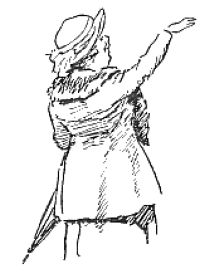

THE limelight is always on the workers, but to the student of humanity the idlers are far more interesting; partly because they have the courage, the fortitude, that doing nothing requires, and perhaps a little because they never strike. I am not referring to the people who, owing to their birthright of a silver spoon, never had the need to do anything, but to those who have secured an independence, often the most meagre but enough to prevent any kind of labour any more, and who have got to get through the day somehow. These are numerically quite strong, particularly in London, where they naturally abound because London provides the greatest amount of free entertainment.
A certain mystery often enshrouds them: they are self-contained, isolated; they live in single rooms which see nothing of them from morn till night; they eat frugally in obscure chop-houses; and the rest of the time is spent in the search for beguilement. They have a vast capacity for being still and allowing the pageant to file past; but they can explore too.
Every police-court knows them, particularly in winter, when sitting in the parks has no longer any attraction; although their defiance of weather is remarkable. They frequent the Old Bailey, and the courts in the Strand, and auction sales have a curious fascination for them—curious in that they never buy anything. The spectacle of other people able and willing to spend money would, one imagines, pall upon those who have not a penny to spare; but it does not. The mere act of competition in the bids—the contest for ownership—provides the sensation of which they are always in need.
It is a question, were the theatres and picture-palaces thrown open to all, whether the kind of flâneurs that I have in mind would congregate there. I rather think that they prefer to carve their own drama out of life. That is why you do not find them much in the picture galleries or museums. These places are for the eye only, and their ears must also be gratified. Compared with even a dull morning in the police-court, even the most exciting prepared play would be tame. They want unrehearsed effects.
Some are silent, self-contained; others argue and impart information. These read the papers with a thoroughness that would be the ruin of busy people. Possibly, indeed, the papers are to a certain extent responsible for their existence, for their curiosity has to be gratified and rather than not read they will give up all else. “If drink interferes with your business”—so runs a facetious notice that I saw recently in a postcard shop in the Strand—“give up your business.” “Newspaper-reading” could be substituted for “drink.” It is a vicious circle. The newspaper offers so much entertainment that the naturally indolent but inquisitive and talkative man neglects his work in order to partake of the varied feast; and then, having nothing to do, he fills up his time by reading the newspaper.
But—and this shows how one’s pen can take control—I did not start out with any intention of adding to the indictment of the sensational press. I was thinking of London’s drones as they were and not of their evolution; which is a totally different matter, needing volumes for the investigator to turn round in. All that I want to say here is that some of them know things, and wish that others should share their knowledge. I was sitting on a seat next one near the Marble Arch on a recent fine day, when he pointed to that enisled and obsolete portal and asked me if I knew what it was used for. I said something about its function having been improved away. He then told me that it is now a police station. Within that massive masonry almost equally massive constables congregate, report, and go on or off duty.
That was news to me. But more was to follow. The arch at the top of Constitution Hill, he said, is a police station too, but it is not merely a station: sixteen constables sleep there. I mean honest sleep (this is not a facetious effort) in their beds. Who would have thought that that quadriga-crowned gateway shelters slumberous guardians of the peace, whose rest the bronze hoofs of Captain Adrian Jones’s prancing steeds are powerless to disturb? Had I sat any longer, no doubt my neighbour would have instructed me about the questions of the day, but I had before me the problem—long since solved by him—of making a living, and so I had to bid him farewell.
And then there is the drone—a perfectly sweet-natured if somewhat prosy person—who is a busybody. The paradox is not so absurd as it sounds: a moment’s thought will convince the reader. I was hearing lately about the funeral of an old caretaker noted among her employers for her vivacity and humour. The ceremony was in one of the London cemeteries, and the three women artists whose studios she had kept always clean and often mirthful were present; the remainder of the company, with one exception, being relations. Among the mourners was an elderly man, white-headed and becomingly dressed, moving here and there with the assurance of the next-of-kin, who, to those ignorant of the composition of the family, was clearly at least an intimate friend. It was, however, the man himself who proved this supposition to be wrong, for, approaching one of the artists, he asked if she could inform him as to the nature of the obsequies—were they those of a man or a woman, a father or a mother? She told him, adding the remark that she had conjectured him to be a near relative. “Oh no,” he said, “but I lost my wife a few years ago, and, having nothing to do, I like to attend funerals and say a few words to the bereaved.”
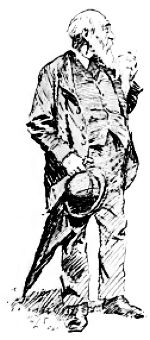
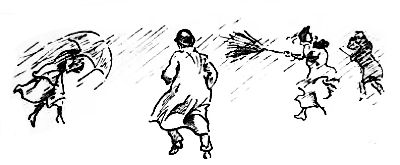
I HAVE to tell an unvarnished tale of real life in London. When the absence of impulsive benevolence and public virtue is so often insisted upon, it is my duty to put the following facts on record.
It was, as just then it always is, a wet day. The humidity not only descended from a pitiless sky, but ascended from the cruel pavements. Need I say that under these conditions no cabs were obtainable; in other words, it was one of those days, so common in winter, when other people engage the cabs first. Cabs were pletiful enough, full. One could have been run over and killed by them twenty times between Trafalgar Square and Picadilly Circus, but all teemed with selfish life. Men of ferocious concentration and women detestable in their purposefulness were to be seen occupying them. And they continued to occupy them. It was a day on which no one ever got out of a cab at all, except to tell it to wait. No flag was ever up.
Not only were the cabs all taken and reserved until to-morrow, but the ’buses were overcroweded too. A line of swaying men, steaming from the deluge, intervened in every ’bus between two rows of seated women, also steaming. It was a day on which the conductors were always ringing the bell three times.
There was also (for in spite of common report to the contrary we can, at times, be very thorough in England) a strike on the tube and the Underground.
Having to get to Harley Street, I walked up Regent Street, doing my best to shelter beneath an umbrella, and (being a believer in miracles) turning my head back at every other step in the hope that a cab with its flag up might suddenly materialise; but hoping against hope. It was miserable, it was depressing, and it was really rather shameful: by January 1921 a.d. (I thought, bitterly, angrily), more should have been achieved by boastful mankind in the direction of weather control.
And then the strange thing happened which it is my purpose and pride to relate. A taxi drew up beside me and I was hailed by its occupant. In a novel the hailing voice would be that of a lady or a caliph incog., and it would lure me to adventure or romance. But this was desperately real, damp, disgusting normal life, and the speaker was merely a man like myself.
“Hullo!” he said, calling me by name, and following the salutation by the most grateful and comforting words that the human tongue could at that moment utter.
Everyone has seen the Confession Albums, where complacent or polite visitors are asked to state what in their opinion is the most beautiful this, that, and the other, always including “the most beautiful form of words”. Serious people quote from Dante or Keats or Shakespeare; flippant persons write “Not guilty” or “Will you have it notes or cash?” or “This way to the exit”. Henceforth I shall be in no doubt as to my own reply. I shall set down the words used this amazing god in the machine, this prince among all princely bolts from the blue. “Let me give you a lift,” he said.
I could have sobbed with joy as I entered the cab—perhaps I did sob with joy—and heard him telling the driver the number in Harley Street for which I was bound.
That is the story—true and rare. How could I refrain from telling it when impulsive benevolence and public virtue are so scarce? It was my duty.

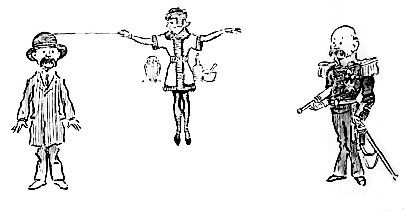
WALKING along Oxford Street the other day, I was aware of a new kind of cheap photographer’s into which people were pouring as though it were a bank where money was being given away. And, after examining the specimen photographs in the frame by the door, I joined them, not for the purpose of facing the camera, but to observe young men and women in the entertaining pastime of escaping from facts, or, in other words, of assuming more agreeable identities than their own.
For the novel characteristic of this studio is that for the trifling sum of one shilling it provides its patrons with six postcard photographs of themselves in fancy dress; or, as a leaflet before me states, a shade too loosely perhaps for Lindley Murray, but with perfect clarity, beneath a list of scores of costumes, “Every customer ordering six postcards for 1 s. are entitled to use which one of these garments they think best, free of charge”.
What a privilege! The list is exhaustive. It begins with Cowboys, goes on to Cowgirls, Indian Chiefs, Indian Man, Policeman, Pierrots, Mexicans, Nuns, Whittington’s Cat, Quaker Girls, Jockeys, Gent’s Evening Suit, Gipsies, Highwaymen, Priests, John Bull, Cricketer, Old Maid, Harem Skirt, Father Christmas, French Soldier, Aviator, Costers, Beef-eaters, Buckingham Suit, Nell Gwynne, Ladies’ Evening Dress, Ladies’ Tights, Boxer, King, Clown. The organisation is perfect. First the queue, then the ticket, then the choice of costume from the wardrobe upstairs, then the donning of it behind a screen, performed with infinite giggling when it is masculine and the wearer a girl, and then the taking of the photograph, which I can assure you is not allowed to occupy more than a few seconds. The only weak spot in the concern is the delay in developing and printing, for the client has to wait a day or so for the glorious results. Still, as a variation upon the drab routine of twentieth-century city life, not bad, is it?
Judging by specimen photographs of the happy masqueraders, the cowboy costume stands very high in favour and is the most popular male dress for young women. These are to be seen also in many varieties of man’s attire, even to that of the police, looking for the most part smirkingly self-conscious but wholly satisfied. That no one would ever be taken in as to their sex matters nothing. A wooden horse of high mettle, obviously by a sire and dam with classic sawdust in their veins, lends verisimilitude to the cowboy illusion, and it is amusing to see this very recognisable noble animal turning up again and again in the pictures, always under perfect control.
I have made only a selection from the costumes supplied. I might have added many more, such as naval officers and hospital nurses, both of which, I am told, are in great demand. I might, too, have mentioned the one that, after the “Buckingham suit” (which is perhaps merely a euphemism for Court dress), is most perplexing to me. This is described curtly as “draper”. Who on earth wants to spend a shilling to be photographed as a draper? And what is a draper’s costume? I have seen thousands of drapers, but they did not differ from haberdashers, tailors, chemists, or hotel clerks. Dan Leno’s shopwalker is probably the type selected—poor Dan having also confused the two functions; for a shopwalker only walks the shop, whereas the deathless figure invented by that ever-to-be-mourned comedian acted as a salesman too.
The success of the studio was inevitable, and I expect a great crop of imitations. For it is based on a sound knowledge of human nature. Its originators know life. Every one who has ever been a child remembers the excitement of dressing up. No game without dressing up in it could compare with one in which father’s tall hat, mother’s best dress, and a hairy hearthrug were introduced; and very few of us ever cease wholly to be children. Throughout life, for most of us, to be somebody else is the thing. Well, at this studio young people who are no longer children play at being children once more. After working all day as clerks, or shopmen, or typists, or domestic servants, how delightful to come here and evade destiny by masquerading as highwaymen, bushrangers, Queens of the Carnival, Dreadnought commanders, and George the Fifth’s courtiers! Better still, how tonic to the self-esteem to be taken in the act of complete mastery of a spirited horse! And what pictures to send away! What gallant portraiture for distant relations and friends.
And—if we only knew—what an invigoration of ordinary life for a while! I like to think that the effect upon a little lodging-house drudge of having been a Queen of the Carnival long enough for the evidence of the camera (which cannot lie) to be secured, cannot wear off at once. Surely she carries her head a shade higher in consequence, and bears the censure of her mistress with increased fortitude? I hope so: I believe so. And I can imagine a general toning-up of self-esteem in many a shop-bound youth in the knowledge, abundantly furnished by these postcards, that were he really the rightful possessor of a naval uniform he would not disgrace it; and this being so, in spite of fate’s embargo he does not do his less illustrious work any the worse.
The strength of this studio is that in it the gods can be made kinder—momentarily.
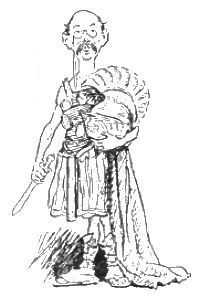
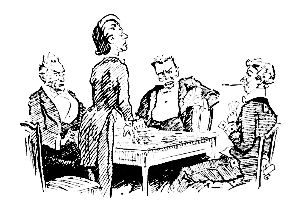
ONCE upon a time the following letters were exchanged between two gentlemen of London:—
Dear Studd,—I am not one ordinarily to take any notice of remarks that are overheard and reported to me; but there are exceptions to every rule, and I am making one now. I was told this evening by a mutual friend and fellow-member that at the Buskin Club, after lunch to-day, in the presence of a number of men, you said that the trouble with me was that I had no sense of humour.
Considering my standing as a comedian, hitherto earning high salaries and occupying the place I do solely by virtue of my comedy gifts (as the Press and Public unanimously agree), this disparagement from a man wielding as much power as you do is very damaging. Managers hearing of it as your honest opinion might fight shy of me.
I therefore ask you to withdraw the criticism with as much publicity as it had when you defamed me by making it.
Why you should have made it at all I can’t imagine, for I have often seen you laughing in your stall, and we have more than once lunched together.
Believe me, yours sincerely,
Fred Golightly.
Dear Golightly,—You have been misinformed. I didn’t say you had no sense of humour; I said you had no sense of honour.
| Yours faithfully, | Sinclair Studd. |
Dear Old Chap,—You can’t think how glad I am to have your disclaimer. I disliked having to write to you as I did, after so many years of good fellowship, but you must admit that I had some provocation. It is a pretty serious thing for a man in my position to be publicly singled out by a man in yours as being without a sense of humour. However, your explanation puts everything right, and all’s well that ends well. Yours as ever,
Fred.
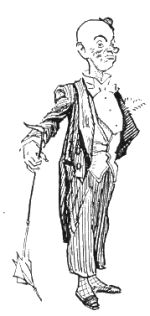
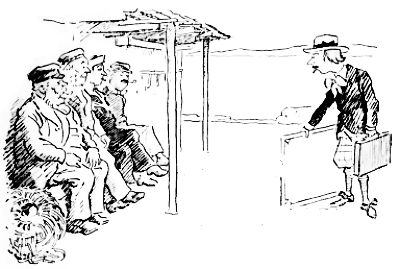
ACCORDING to information supplied to me by a keen and humorous student of life, there was once an artist with historical leanings not unassociated with the desire for pelf—pelf being, even to idealists, what petrol is to a car. The blend brought him one day to Portsmouth, where the Victory lies, with the honourable purpose of painting a picture of that famous ship with Nelson on board. The Admiral was, of course, to be depicted in the act of dying, and the meritorious intention of the artist, whose wife wanted some new curtains, was to make the work as attractive as might be and thus extract a little profit from the wave of naval enthusiasm which was then passing over the country; for not only was the picture itself to be saleable, but reproductions were to be made of it.
Permission having been obtained from the authorities, the artist boarded the Victory, established his easel on her deck, and settled down to his task, the monotony of which was pleasantly alleviated by the chatter of the old salts who guard the ship and act as guides to the tourists visiting her. All these estimable men not only possessing views on art, but having come by now to the firm belief that they had personally fought with Nelson and witnessed his end (and even perhaps partaken of his dying kiss), their criticisms were not too easily combated: so that the artist had not a tedious moment. Thus, painting and conversing, three or four days passed quickly away and the picture was done.
So far there has been nothing to strain credulity. But a time will come—is, in fact, upon us.
On the evening of the last day, as the artist was sitting at early dinner with a friend before catching the London train, his remarks turned (as an artist’s sometimes will) to the work upon which he had just been engaged. He expressed satisfaction with it in the main, but could not, he said, help feeling that its chances of becoming a real success would be sensibly increased if he could find as a model for the central figure some one whose resemblance to Nelson was noticeable.
“It seems to be a law of nature,” he went on, “that there cannot exist at the same time—that is to say, among contemporaries—two faces exactly alike. That is an axiom. Strange as it may sound, among all the millions of countenances with two eyes, a nose in the middle, and a mouth below it, no two precisely resemble each other. There are differences, however slight.” (He was now beginning really to enjoy the sound of his own voice.) “That is, as I say, among contemporaries: in the world at the moment in which I am speaking. But,” he continued, “I see no reason why, after the lapse of years, Nature should not begin precisely to reproduce physiognomies and so save herself the trouble of for ever varying them. That being so, and surely the hypothesis is not too far-fetched”—here his friend said, “No, not at all, oh no!”—“that being so, why,” the artist continued, “should there not be at this moment, more than a century later, some one whose resemblance to Nelson is exact? He would not be necessarily a naval man—probably, indeed, not, for Nelson’s face was not characteristic of the sea—but whoever he was, even if he were an archbishop, I,” said the painter firmly, “should not hesitate to go up to him and ask him to sit to me.”
The friend agreed that this was a very proper attitude, and that it betokened true sincerity of purpose and devotion to Art.
“Nelson’s face,” the painter continued, “was an uncommon one. So large and so mobile a mouth is rare. But it is by no means impossible that a duplicate exists, and no matter who was the owner of it, even were he an archbishop, I should not hesitate to go up and ask him to sit to me.”
(For the benefit of any feminine reader of this veracious history, I may say that the repetition which she has just noticed is not a slip on my part, but has been carefully set down. It is an attempt to give verisimilitude to the conversation—because men have a habit of saying things like that twice.)
The friend again remarked that the painter’s resolve did him infinite credit, and the two started for the station, still conversing on this theme.
On entering their carriage the first thing to take their attention was a quiet little man in black, who was the absolute double of the hero of Trafalgar.
“Good gracious!” whispered the painter excitedly, “do you see that? There’s the very man. The likeness to Nelson is astonishing. I never saw anything like it. I don’t care who he is, I must tackle him. It’s the most extraordinary chance that ever occurred.”
Assuming his most silky and deferential manner—for, though clearly not an archbishop, unless in mufti, this might yet be a person of importance—the painter approached the stranger and tendered a card.
“I trust, sir, that you will excuse me,” he began, “for the liberty I am taking, but I am an artist and I happen to be engaged on a picture of Nelson on the Victory. I have all the accessories and so forth, but what I very seriously need is a brief sitting from some gentleman with a likeness to the great Admiral. Such, sir, as yourself. It may be news to you—it probably is—but you, sir, if I may say so, are so like the famous and immortal warrior as almost to take one’s breath away. It is astonishing, wonderful! Might I—would it be—could you—would you, sir, be so very kind as to allow me to paint you? I would, of course, make every effort not to inconvenience you—I would arrange so that your time should be mine.”
“Of course I will, guv’nor,” said the man. “Being a professional model, I’ve been sitting for Nelson for years. Why, I’ve been doing it for an artist this very afternoon.”
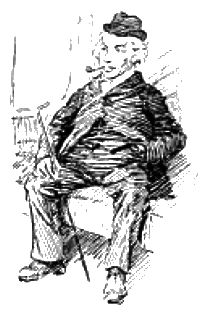
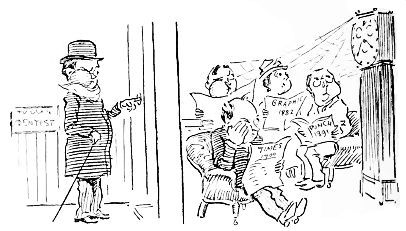
NEXT to golf there is perhaps no pleasure greater, between men, than pointing out what is wrong—wrong not only in the Government, which of course is perpetually vulnerable, but in social life too.
Oysters, for example. At the beginning of every new oyster season—and to many right-minded men life is a blank between April 30th and September 1st—the papers tell us, with dismal iteration, that there never was such a good crop, and oysters are among the few things which events have not made dearer, and even the poor man can enjoy his oysters this year, and at Billingsgate they are so cheap that twenty a shilling can be obtained retail and every one with a pearl in it, and a lot more besides; but none the less the restaurants go on asking four or five shillings a dozen, as though nothing had occurred to bring the price down.
Surely that’s a subject for discussion! Fourpence to fivepence each for oysters just because there is a selfish—or shall I say?—yes, I will chance it—a shell-fish ring which is determined that the public, at any rate the richer public, shall not participate in cheap rates! It is of course a scandal.
No wonder that that little band of true patriots, censors and friends of man and equity (of whom I am one) which assembles in the corner of a smoking-room of a certain club, have something to say about it. But our remarks on the delicious bivalve, as the stylists call it, and inflated prices, need not be quoted here. It is to our decisions with regard to another unsatisfactory affair that I wish to call attention.
Somebody—I think it was Masters—began it by informing us that he had a story of medical turpitude to unfold to us. But he had no chance, for old Colonel Blythe was all over him in an instant.
“Don’t say anything against doctors,” he said. “I won’t listen to it. Doctors are all right. They do their best. It’s dentists that want reforming.”
A murmur of support indicated how widespread was this feeling.
“Yes, sir,” the Colonel went on, “there may be a doctor here and there who is deficient. But take them as a whole, they’re wonderful. They’re fine fellows. They work. They consider their patients. If you’re ill your doctor comes to you; he doesn’t command you to go to him. If you need half a day’s attention he gives it to you. If you’re bad in the night you can send for him, and he’ll get up. You know the address and his home telephone number; and he’ll come the next day too, and every day, and sometimes twice a day—till you’re well, or dead. But what does a dentist do?”
The Colonel glared at us as furiously as though we too lived by our forceps and were utterly depraved.
“What does a dentist do?” he repeated. “I’ll tell you. The dentist does as little as he can. To begin with, he doesn’t come to us at all, but sends for us: flings us half an hour here, on Monday, say, at 11.30, and then half an hour on Friday at 4.15, just as if he were an employer of labour and we were starving applicants. And when we get there he is never ready, and then when we reach his room he is in a hurry because it is late, and most of the time he is leaving us to go to the telephone; and if, when we go away and have pain, we want to get at him again, we can’t, because he never lives at his business address, and if he did he wouldn’t be at home, but would be playing billiards somewhere, or golf. All dentists play both. A doctor lives where he practises, but a dentist never does. Dentists practise in Welbeck Street and live at Great Missenden. Yes, sir, Great Missenden; that’s what dentists do. I tell you they’re clever fellows, and we’re their dupes. You can’t ring a dentist up in the night; no one ever spoiled a dentist’s rest yet. And as for Saturdays and Sundays, they never show up at all either day.
“And that’s not all,” the Colonel continued. “They’re always too busy. However busy a doctor is he can always come to-day. A dentist can’t find a minute till Thursday, and then you must be squeezed in between other patients.
“And then their bills. Anyone else tells you what you are paying for. A dentist says ‘Attendance—thirty guineas’. On consulting the dictionary I find that ‘attendance’ means ‘waiting on’. Now, who does the waiting at the dentist’s—you or he? Why, you do, of course. It’s all waiting and under dashed uncomfortable conditions too, with back numbers of The Graphic, and a lot of frowsy people who it is ten to one are to be called before you are. Attendance, indeed! Why, we ought to be paid for our lost time.
“But it will all have to be changed. There’s a fortune for the dentist who does not take on more than he can properly accomplish, who keeps his appointments, who realises that teeth don’t respect office hours and ache only between 10 and 5, and who, living in London, is accessible at odd times. Dentists have been bullying us too long. They’ve got to come into line.”
“When?” I ventured to ask.
“Well,” said the Colonel, “you won’t see it, and I won’t. And our sons won’t. But possibly our grandsons, when they’re very old men, may.”
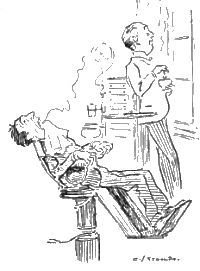
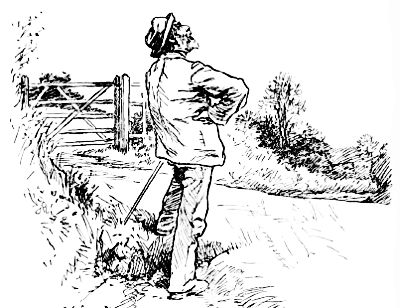
FOR most authors, and indeed all who confine themselves to prose and never dabble in words for music, the busy bee performs a large part of his labours in vain. In other words, they have no use for those preparations of wax with which gramophone records are made. But now and then even a writer of prose is susceptible to aberration, and it was during one such mood, not so long ago, that the idea came to me to put together some couplets which, when repeated by the gramophone with certain realistic accessories, might have the effect of reminding distant emigrants from England of the England that they have left, possibly fill them with homesickness, and incidentally be of assistance to me in adding butter to bread.
At the first blush one might say that such a motive savoured if not of cupidity at any rate of inhumanity; but I believe that people derive more pleasure from a pensive melancholy, a brooding, lingering wistfulness, than from many positive delights: and it was this seductive nostalgia that my verses were designed to bring to them.
The suggestion came to me, suddenly, as I listened in a music hall to a French gentleman in evening dress whose special genius lay in the imitation of birds. Such was the fidelity with which he trilled forth the notes of the nightingale on the cold January evening on which I heard him, that he made the wish for June almost unbearable: and upon that pain of my own I resolved to try and erect an edifice of not disagreeable unhappiness for others.
Talking over the project with one who is behind the scenes in Edisonian mysteries, I obtained my first glimpses into the rules that govern the activities of the talking machine. Possibly these facts are commonplaces to the reader, but to me they were startling novelties. Each record, he told me, has to be of a definite length, of which two minutes is the extreme, and whatever words and effects I was aiming at must therefore be compressed into that space. This meant an instant modification of my scheme, for I had planned no more than enough material for one minute; and it was then that the skylark fluttered into the heavenly choir, and the catalogue of the country’s charms, as you will shortly see, divided itself into day and evening.
The next thing that the expert told me was that one must not be too clever.
Here, of course, I bowed, murmuring something about impossibility.
By too clever, he went on, without paying any attention to my self-deprecation, he meant too literary. The gramophone public was not over subtle: the appeal being through the ear alone, and a swift one at that, there must be no ambiguity, no preciosity; each word must do its own work, and do it emphatically.
I agreed, and was conscious again of that feeling of respect which always comes upon me in the presence of one of those rare masterful beings who know what the public want.
“Why not,” he went on, “complete the picture? Call the first part ‘The Village,’ and then provide a city pendant for the other side of the record, so that the town-dweller as well as the country-dweller may be roped in?” (The italics are his.)
“Why not indeed?” I replied.
“With city effects which will occur to you,” he said.
“Of course,” said I, and walked thoughtfully away, realising once more how dangerous is impulsiveness. Why had I ever embarked on this scheme? Why had I abandoned my old friend prose? Why was I flirting with science? . . .
None the less, as I went on I found a certain amusement in writing verses for wax, and gradually “The Old Country” was finished—Part I. The Village, and Part II. The Town—and ready to be converted into magic.
To what extent gramophone recording rooms differ I cannot say; but the one in which “The Old Country” was prepared is on a top floor in the city of London, with large windows through which more than one of Wren’s spires may be seen. In it, when I arrived, were gathered the orchestra, the conductor, the chief operator (in a long surgical coat), the elocutionist who was to deliver the lines into a metal funnel, the French gentleman with an aviary in his throat, my friend the expert, and a number of supernumeraries for London’s cries and tumult—some of which sounds in their authentic genuine expression we could hear by opening the window, but not loudly enough for our dramatic purpose.
Every one seemed composed and at peace with the world, except the elocutionist, who paced the floor muttering my poor verses over to himself in an agony that did me no credit; except myself, who could not but be infected by his distress; and the French gentleman, who wandered disconsolately among the company, talking to no one, but occasionally refreshing his memory as to the differences of note between the two birds he was engaged to reproduce: certainly an important point to settle definitely before we began.
Of the gramophone recording apparatus itself nothing was visible, for the registering was done behind the partition. Penetrating thither, I found that it consists of nothing but a revolving disk of yellowish-brown wax, into which a needle, vibrating to the elocutionist’s voice and my wonderful poetry, was to plough furrows, throwing up a churning wake of gossamer shavings as it did so; these furrows, which are of every shade of depth, by Edisonian black art reproducing and subsequently giving forth again my exact syllables for all the world to hear. But how or why I shall never understand.
I have vague recollections of an explanatory lecture on the subject from the chief operator; but I can pass none of his secrets on. The telephone and the telegraph, the Marconigraph and the automatic piano-player, will never be anything but the darkest enigmas; and almost before any of them comes, for marvellousness, the gramophone. But to the chief operator in his surgical coat its simplicity is a matter for laughter. So different are we all! Of such variety is human intelligence!
The three or four rehearsals, for time signals and so forth, being completed, we began. This was the procedure. First, absolute silence. Then the electric lamp on the operator’s partition turning to red, the orchestra played a bar or so of “Home, Sweet Home,” into which the elocutionist, who had now taken off not only his coat but his collar, for the better grappling with my muse, broke with the following lines:—
O England, country of my heart’s desire,
Land of the hedgerow and the village spire,
Land of thatched cottages and murmuring bees,
And wayside inns where one may take one’s ease,
Of village greens where cricket may be played,
And fat old spaniels sleeping in the shade—
O homeland, far away across the main,
How would I love to see your face again!—
Your daisied meadows and your grassy hills,
Your primrose banks, your parks, your tinkling rills,
Your copses where the purple bluebells grow,
Your quiet lanes where lovers loiter so,
Your cottage-gardens with their wallflowers’ scent,
Your swallows ’neath the eaves, your sweet content!
And ’mid the fleecy clouds that o’er you spread,
Listen, the skylark singing overhead. . . .
It was here that my part of the production began, for the French gentleman, whose understanding of the whole matter seemed still exceedingly misty, in spite of rehearsals and instructions, had been placed wholly in my charge, and at the given moment I was to lead him as close as might be to the funnel, tap him, as agreed, on the shoulder, and thus let loose his skylark. Had there been no other bird, all would have been simple, but the presence also of the nightingale, in the same receptacle, was an embarrassment; and twice through nervousness he liberated the wrong chorister, and we had to begin again, while once I myself ruined an otherwise perfect record by exclaiming, when I thought it all over, “Bravo!” and slapping the French gentleman’s back—this unfortunate remark attaching itself inseparably to the recitation.
It was not, I ought to say, exactly at the end of the verse that the skylark was to begin; but at the word “spread,” the last line being spoken through the bird’s notes. After that the blithe spirit had it all its own way for about ten seconds, when I tapped Monsieur sharply once more and drew him swiftly and silently away, while the reciter took his place at the funnel and with a sigh of satisfaction completed the first verse with these words:—
That’s the old country, that’s the old home!
You never forget it wherever you roam.
Instantly the orchestra plunged into the opening of “The Swanee River,” and again the reciter began, while I clung to the French gentleman in an agony, for the only expression on his countenance was one of determination to be a nightingale, whereas on no account must he become one until the words “they and I,” almost at the end. With my arm firmly through his I awaited in a cold perspiration the cue. Here is the second verse:—
I know an English village O so small!
Where every cottage has a whitewashed wall,
And every garden has a sweetbriar hedge,
And there’s a cat on every window-ledge.
And there’s a cottage there with those within it
Whom I in fancy visit every minute.
O little village mine, so far away,
How would I love to visit you to-day!
To lift the latch and peep within the door
And join the happy company once more—
I think I’d try and catch them at their tea:
What a surprise for every one ’twould be!
How we would talk and laugh, maybe and cry,
Living our lost years over, they and I,
And then at dusk I’d seek the well-known lane
To hear the English nightingale again.
This time all went well. At “they and I” the nightingale broke in and continued until the concluding rounding-up couplet:—
That’s the old country, that’s the old home!
You never can beat it wherever you roam.
So much for Part I. The Village. It was the end also of the French gentleman, who went off to wet one or more of his many whistles, while the supernumeraries gathered together with designs on city illusion. One (a minute Osborne cadet, who appeared mysteriously from nowhere) carried a motor horn; another, a fire bell; another, a policeman’s call; and a fourth, a wooden rattle which, when turned slowly, made a series of cracks resembling shots in a rifle saloon.
All being ready, we froze into silence and awaited the incarnadining of the lamp. Then one of the musicians struck Big Ben’s chimes on a series of metal pipes, the orchestra followed with a bar or so of “Sally in our Alley,” and the elocutionist plunged into Part II. The Town:—
O London, once my home but now so far,
You shine before me brighter than a star!
By night I dream of you, by day I long
To be the humblest even of your throng:
Happy, however poor, however sore,
Merely because a Londoner once more.
Your sights, your sounds, your scents—I miss them all:
Your coloured ’buses racing down Whitehall;
The fruit stalls in the New Cut all aflare;
The Oval with its thousands gathered there;
The Thames at evening in a mist of blue;
Old Drury with a hundred yards of queue.
Your sausage shops, your roads of gleaming mud,
Your pea-soup fogs—they’re in my very blood;
And there’s no music to my ear so sweet
As all the noisy discord of the street.
At these words the reciter stepped aside and conceded the funnel to ’bus conductors shouting “Higher up!” policemen ordering people to move on, newspaper boys with “A Winner!” and costermongers noisily commending fruit; while in the background the Osborne cadet pinched the motor horn without mercy. At a signal, peace suddenly was restored, and
That’s my dear London, that’s my old home!
I’ll never forget it wherever I roam,
said the elocutionist.
For the introductory bars of the second verse we had “There is a Tavern in the Town,” with which these words merged:—
And ah! the London pleasure parties too!—
The steamboat up to Hampton Court or Kew;
The walk among the deer in Richmond Park;
The journey back, all jolly, in the dark!
To Epping Forest up the Mile End Road,
Passing the donkey barrows’ merry load;
Or nearer home, to Hampstead for a blow;
To watch old London smouldering below;
Between the Spaniards and Jack Straw’s to pace
And feel the northern breezes in one’s face;
Then at the Bull and Bush perhaps to dine
And taste again their famous barley wine!
Ah me! I wonder is it all the same?
Is Easter Monday still the good old game?
I hear it yet, though years have rolled away,
The maddening medley of Bank Holiday.
Here came our greatest effect at realism. The band broke into a typical roundabout waltz, through which rifles snapped, whistles blew, cocoanut-shy men exhorted you to roll, bowl, or pitch, and a showman bellowed forth the importance of visiting a fat lady. And with the words:—
That’s my dear London, that’s my true home,
I’ll never forget it wherever I roam,
the record was complete.
What New Zealand and Australia, Johannesburg and the Yukon think of it, I have yet to learn. Nor has butter blossomed much on the bread. But it was great fun.

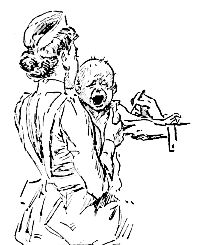
LOOKING the other day into Grimm, I came upon the story called “Hans in Luck,” in which a foolish fellow, having his life’s savings in a bag, gives them away for an old horse, and the old horse for a cow, and the cow for a pig, and so on, until at last he has only a heavy and very tiresome stone in his possession, and then getting rid of that burden he thinks himself the most fortunate of men—Hans in luck. It was the very ordinary metal of this folk-tale which Hans Andersen transmuted to fine gold in the famous story entitled (in the translation on which I was brought up), “What the old man does is always right,” which is a veritable epic in little of simplicity and enthusiasm. No one who has read it can forget it, for its exquisite author is there at his kindliest and sunniest, all his sardonic melancholy forgotten.
The old man, in bitter financial straits, setting out in the morning to sell his cow at market, makes, in his incorrigible optimism, a series of exchanges, all for the worse, so that when he reaches home in the evening, instead of a pocketful of money to show for his day’s dealings, he has only a sack of rotten apples. Nothing, however, has dimmed his radiant faith in himself as a good trafficker, and nothing can undermine his wife’s belief in him as the best and financially most sagacious of husbands: a belief which, expressed in the presence of two gentlemen who, having had a wager on her unshakeable loyalty, had come to the house to settle it, led to the old couple’s enrichment and assured prosperity.
It was this charming story which came to my mind in the train the other day as I looked at the young sandy-haired and freckled soldier opposite me on the journey to Portsmouth, for here was another example of impulsive simplicity. On the back of his right hand was tattooed a very red heart, emitting effulgence, across which two hands were clasped, and beneath were the words, “True Love”; and on the back of his left hand was tattooed the head of a girl. He was perhaps twenty. With ordinary luck, I thought, as from time to time I glanced at him, he will probably live to be seventy. Since tattoo marks never come out and the backs of one’s hands are usually visible to oneself, he is likely to have some curious thoughts as he passes down the years. What kind of emotions, I wondered, will be his as he views them at thirty-one, forty-one, fifty-one? And supposing that this first love fails, what will be the attitude of subsequent ladies to the backs of his hands? For it will probably be in vain, even if he be sophisticated enough to think of it, for him to maintain that the decoration is purely symbolic, the right-hand device standing for devotion and the left for woman in the abstract. That will hardly wash. Subsequent ladies—and judging from his appearance and his early start there are sure to be some—may give him rather a difficult time.
It all goes once more to prove what a dangerous thing impulsiveness can be. And yet as I looked at his simple face, and reflected on what safe areas of normally-hidden epidermis he possessed for such pictorial ebullition, I found myself envying such a lack of self-protectiveness; and I asked myself if, after all, those who will have nothing to do with self-protectiveness are not the salt of the earth. The gamblers, the careless, the sippers of all the honey the moment contains: are not these the best?
Most young ardencies are not as reckless as his—and, of course, it may all end happily: what the young man did may turn out also to be right. With all my heart I hope so.
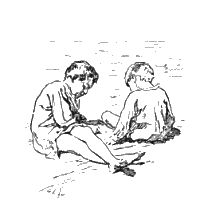
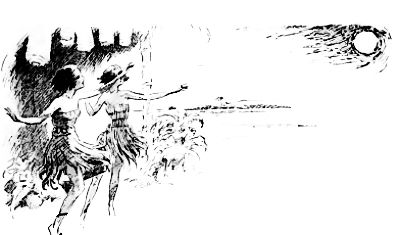
MY friend and I occupied facing seats in a railway carriage on a tedious journey. Having nothing to read and not much to say, I gazed through the windows at the sodden English winter landscape, while my friend’s eyes were fixed on the opposite wall of the compartment, above my head.
“What a country!” I exclaimed at last. “Good heavens, what a country to spend one’s life in!”
“Yes,” he said, withdrawing his eyes from the space above my head. “And why do we stay in it when there are such glorious paradises to go to? Hawaii now. If you really want divine laziness—sun and warmth and the absence of all fretful ambition—you should go to the South Seas. You can’t get it anywhere else. I remember when I was in Hawaii——”
“Hawaii!” I interrupted. “You never told me you had been to Hawaii.”
“I don’t tell everything,” he replied. “But the happiest hours of my existence were spent in a little village two or three miles from Honolulu, on the coast, where we used to go now and then for a day’s fun. It was called—let me get it right—it was called Tormo Tonitui—and there were pleasure-gardens there and the most fascinating girls.” His eyes took on a far-away wistfulness.
“Yes, yes?” I said.
“Fascinating brown girls,” he said, “who played that banjo-mandoline thing they all play, and sang mournful voluptuous songs, and danced under the lanterns at night. And the bathing! There’s no bathing here at all. There you can stay in the sea all day if you like. It’s like bathing in champagne. Sun and surf and sands—there’s nothing like it.” He sighed rapturously.
“Well, I can’t help saying again,” I interrupted, “that it’s a most extraordinary thing that, after knowing you all these years, you have never told me a word about Honolulu or the South Seas or this wonderful pleasure-garden place called—what was the name of it?”
He hesitated for a moment. “Morto Notitui,” he then replied.
“I don’t think that’s how you had it before,” I said; “surely it was Tormo Tonitui?”
“Perhaps it was,” he said. “I forget. Those Hawaiian names are very much alike and all rather confusing. But you really ought to go out there. Why don’t you cut everything for a year and get some sunshine into your system? You’re fossilising here. We all are. Let’s be gamblers and chance it.”
“I wish I could,” I said. “Tell me some more about your life there.”
“It was wonderful,” he went on—“wonderful. I’m not surprised that Stevenson found it a paradise.”
“By the way,” I asked, “did you hear anything of Stevenson?”
“Oh, yes, lots. I met several men who had known him—Tusitala he was called there, you know—and several natives. There was one extraordinary old fellow who had helped him make the road up the mountain. He and I had some great evenings together, yarning and drinking copra.”
“But I thought Stevenson lived in Samoa,” I said.
“Same thing,” he replied.
“Did he tell you anything particularly personal about him?” I asked.
“Nothing that I remember,” he said; “but he was a fine old fellow and as thirsty as they make ’em.”
“What is copra like?” I asked.
“Great,” he said. “Like—what shall I say?—well, like Audit ale and Veuve Clicquot mixed. But it got to your head. You had to be careful. I remember one night after a day’s bathing at—at Tromo Titonui——”
“Where was that?” I asked.
“Oh, that little village I was telling you about,” he said. “I remember one night——”
“Look here,” I said, “you began by calling it Tormo Tonitui, then you called it Morto Notitui, and now it’s Tromo Titonui. I’m going to say again, quite seriously, that I don’t believe you ever were in Hawaii at all.”
“Of course I wasn’t,” he replied. “But what is one to do in a railway carriage, with nothing to read, and a drenched world and those two words staring one in the face?” and he pointed to a placard above my head advertising a firm which provided the best and cheapest Motor Tuition.
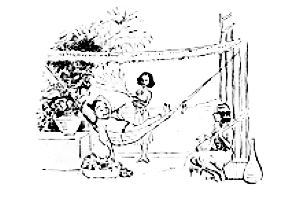
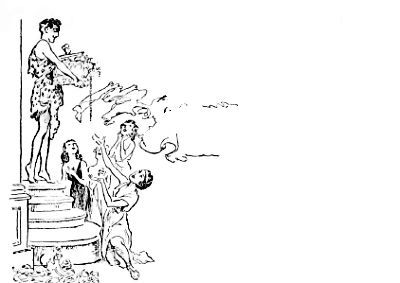
SOME one has offered me a very remarkable and beautiful and valuable gift—and I don’t know what to do. A few years ago I should have accepted it with rapture. To-day I hesitate, because the older one grows the less does one wish to accumulate possessions.
It is said that the reason why Jews so often become fishmongers and fruiterers and dealers in precious stones is because in every child of Israel there is a subconscious conviction that at any moment he may be called upon to return to his country, and, naturally wishing to lose as little as possible by a sudden departure, he chooses to traffic either in a stock which he can carry on his person, such as diamonds, or in one which, being perishable and renewable day by day, such as fruit and fish, can be abandoned with almost no loss at all. Similarly the Jews are said to favour such household trappings as can be easily removed: rugs, for example, rather than carpets. I have not, so far as I know, any Jewish blood, but in the few years that are left me I too want to be ready to obey the impulse towards whatever Jerusalem I hear calling me, even should it be the platonically-loved city itself, although that is unlikely. Without possessions one would be the readier also for the longer last journey.
I was lately led by its owner, rebuilder, and renovator through the rooms and gardens of a Tudor house which, with infinite thought and discretion, has been reclaimed from decay and made fair and debonair. At every step, indoors and out, was something charming or adequate, whether furniture or porcelain, whether flower or shrub. Within were long cool passages where through the diamond panes sunlight splashed on the white walls, and bedrooms of the gayest daintiness; without were lawns, and vistas, and arrangements of the loveliest colours.
“Well,” my hostess asked me, “what do you think of it all?”
I thought many things, but the one which was uppermost was this: “You are making it very hard to die”.
I had a grandfather who, after he had reached a certain age, used birthdays as occasions on which to give away rather than receive presents; and I am sure he was right. But I would go beyond that. The presents which he distributed were bought for the purpose. I would fix a period in life when the wise man should begin to unload his acquisitions—accumulating only up to that point and then dispersing among the young. Ah! but you say, why be so illogical? If possessions are undesirable, are they not undesirable also for the young? Well, there are answers to that. For one thing, who said anything about being logical? And then, are we not all different? Because I choose to cease accumulating, that is no reason why others, who like to increase their possessions, should cease also. And again, even I, with all my talk of renunciation, have not suggested that it should begin till a middling period has been reached. And I am all for circulating treasures of art too. I should like a continual progression of our national pictures and other beautiful things throughout the kingdom, so that the people in all the great towns could have the chance of seeing the best as well as the visitors to Trafalgar Square and South Kensington.
So far am I from withholding possessions from others, that as I walked down Bond Street the other day and paused at this window and that, filled with jewels and enamelled boxes and other luxurious trifles, I thought how delightful it would be to be rich enough to buy them all—not to own them, but to give them away. To women for choice; to one woman for choice. And I remember a letter from France during the War which mentioned a variety of possessions that, in the trenches, provided extraordinary and constant pleasure and consolation. The writer was a lady who worked at a canteen in the big Paris terminus for the front, to whom the soldiers returning from their leave often displayed the mascots and other treasures designed to comfort them in their vigils. Sometimes these possessions were living creatures. One soldier, she said, recently had produced from a basket a small fox which he had found and brought up, and which she fed with bread and milk while its owner ate his soup. Another had a starling. A third took out of his pocket a venerable handkerchief, which, on being unrolled, revealed the person of Marguerite—a magpie whom he adored, and who apparently adored him. They were inseparable. Marguerite had accompanied him into action and while he was on permission, and she was now cheering him on his return to the danger zone. She was placed on the table, where she immediately fell asleep; at the end of the meal the poor fellow rolled her again in the handkerchief, popped her in his pocket, and ran for his tragic train.
But for the companionship of Marguerite this poilu’s heart would have been far heavier; and she was thus a possession worth having. But the ordinary ones? No. They encumber and retard.
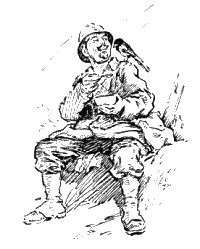
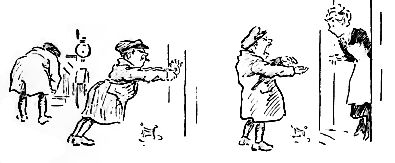
“WE must wait a minute or two for Sir Charles,” said our hostess. “Every one else is here,” and she beamed around the room.
The various mauvais quart d’heure dialogues that this speech had interrupted were resumed, most of them switching on to the question of punctuality. And then a cab was heard to stop outside, and after a minute or so, presumably spent in financial transactions, the bell rang and the knocker knocked.
“That’s Sir Charles,” said our hostess; “there he is”; and a few moments later the guest we all awaited so fervently was in the room, full of apologies.
“Never mind why you’re late,” said our hostess, “I’m sure you couldn’t help it. Now we’ll eat,” and once again a dozen Londoners fell into ark-approaching formation and moved towards repletion.
The party was familiar enough, after certain solvents of speech had been applied, for conversation to become general; and during the entrée we were all listening to Sir Charles telling a story of an eminent numismatist who, visiting the British Museum, was taken for a thief. By way of making the narration the more vivid he felt in his pocket for a coin with which to illustrate the dramatic crisis, when his expression became suddenly alarmed and fixed.
“Good heavens!” he said, fumbling nervously all over his clothes, “I’ve given it to the cabman. Of all the infernal idiocy! I knew I should. I had a presentiment that I should get it muddled up with my other money and give it away.”
“What was it?” he was asked.
“Was it something very valuable?”
“Was it a rare coin?”
Murmurs of sympathy made a low accompaniment.
“It was a goldmohur,” said Sir Charles. “A very beautiful coin of the Moguls. I keep it as a kind of mascot. I’ve had it for years, but left it behind, and I got it again from India only this morning. Having come away without it I sent a cable for it to be forwarded on. And now! It’s the rottenest luck.”
“What was it worth?” our hostess asked.
“Not very much. Thirty pounds perhaps. But that isn’t it. The money is nothing—it’s the sentimental associations that make the loss so serious.”
“Well,” said a practical man, “you needn’t despair. Ring up Scotland Yard and ask them the best thing to do.”
“Did you take the cabman’s number?” some one asked.
“Of course he didn’t,” our hostess replied. “Who ever does a thing like that?”
“As a matter of fact,” said Sir Charles, “I sometimes do. But this time, of course, I didn’t.” He groaned. “No, it’s gone for ever. The cabman will see it’s gold and sell it. I wouldn’t trust your modern taxi-chauffeur with anything.”
“If you would feel any happier,” said our hostess, “do telephone now.”
“No,” said Sir Charles, “no. It’s no use. A coin like that would never be surrendered. It’s too interesting; even a cabman would realise that. Umbrellas they’ll take back, of course—umbrellas and bags, but not a goldmohur. He’ll either keep it to show his pals in public-houses, or have it fixed up as a brooch for his wife.”
And he turned gloomily to his neglected plate.
A few minutes later the knocker was heard again to knock, and then one of the maids approached her mistress and spoke to her in low tones.
Our hostess brightened. “Now, Sir Charles,” she said, “perhaps you’ll revise your opinion of our taxi-drivers. Tell Sir Charles what it is,” she said to the maid.
“If you please,” the maid began, “there’s a cabman at the door. He says he brought a gentleman here and——” Here she faltered.
“Go on, Robins,” said her mistress.
“If you please, I don’t like to,” said the girl. “It’s so—so——”
“I should like to hear it exactly,” said Sir Charles.
“Well,” said the maid with a burst of courage, “he says there’s a gentleman here who—who bilked him—who passed a piece of bad money on him in the dark. Here it is,” and she handed Sir Charles the goldmohur. “And he says if he doesn’t get an honest shilling in exchange for it he’ll have the law on him.”
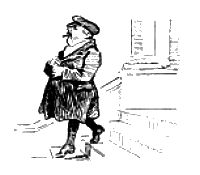
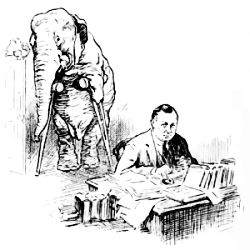
IT is my good or ill fortune to have taken a furnished flat at a dizzy altitude in the neighbourhood of a terminus which is at once nearest the sea and the Promised Land. Immediately above the flat is a spacious roof, which affords a pleasant retreat in the cool of the evening and commands what the agents call an extensive prospect, and where, at most hours, toy dogs may be met. The flat itself consists of a number of rooms the walls of which are covered with photographs of men, women, and children, almost as thickly as the pages of a schoolboy’s album are covered with stamps. There are more men than women, and more women than children. The men have obsolete beards; several of the women seem to be sisters, and have been taken together with their heads inclining towards each other at an affectionate angle, which, although affectionate, does not render the thought impossible that each sister secretly is convinced that she is the handsomer. There are also sets of children graduated like organ pipes. These photographs not only hang on the walls, but they swarm in frames about the mantelpieces and the occasional tables. The occasional tables are so numerous and varied in size that one might imagine this their stud farm.
The beginning of my tenancy was marked by a tragedy. The larder window having been left open by the previous occupants, a large slate-coloured pigeon, with plans for a family, had made a nest and laid an egg in it, and, at the very moment when I suddenly opened the door, was preparing to lay another. To this achievement I personally should have had no objection; but the porter, who was showing me round, and who has a sense of decorum more proper to such apartments, had other views, and before I could interfere he had removed the egg, brushed away the nest, and closed the window. That ended his share of the drama; but mine was to begin, for ever since that day the pigeon, with a depth of reproachfulness in its eyes that is extremely distressing, has sat on the kitchen window-sill making desperate efforts to get in, so that I creep about feeling like Herod. During Baby Week it was almost unbearable. Even when I am far from the kitchen I can hear its plaintive injured cooing. The flat is conspicuous in possessing, in addition to numerous other advantages, such as a night porter to work the lift, who is never visible, and a day porter who, having been forbidden by the powers that be to use the lift before two o’clock in the afternoon, scrupulously obeys the new regulation, except when he has to ascend to an upper floor himself: the flat has, in addition to these advantages, windows that refuse to be lifted by any but a Hercules, and doors (ten in all) not one of which will remain open except by artificial means. Whether or not this is a peculiarity of Westminster architecture I cannot say, but all the doors are alike. They each quickly but remorselessly close, yet so gently that the latch does not catch, and every breath of draught (and we by no means stop at breaths) sways them noisily to and fro with a sound that is excessively irritating to the nerves. I have therefore either to go to the door and fasten it or find something with which to fix it open. Normally, I use a chair or a weight from the kitchen scales; but two of the rooms—the drawing-room, where the occasional tables have been most fecund, and the dining-room, where I do everything but dine—are supplied with door-stops of their own, consisting each of an elephant’s foot mounted with brass. Picture me then, the most Occidental of men, moving about this intensely sophisticated flat carrying from room to room the foot of a mammoth of the Indian jungle or the African forest (I don’t know which) in order to prevent a London door from banging.
If there were four of these feet I should be more at ease. But there are only two of them, and elephants are quadrupeds. Where then are the other two? That is the question which is wearing me out. I lie awake at night, wondering, and then falling into an uneasy sleep hear a heavy stumbling tread on the stairs and wake in terror expecting the door to burst open and the other half of the elephant to advance upon me demanding its lost feet. It is always a dreadful nightmare, but never more so than when the mammoth not only towers up grey and threatening, but coos like an exiled pigeon.
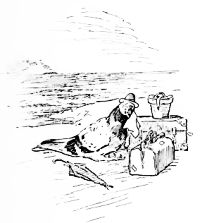
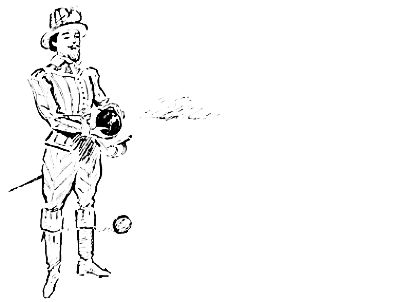
TURNING from the Hoe with the intention of descending to the town of Plymouth by one of the paths through the lawns at the back of the great sailor’s statue, what should confront me but the most perfect bowling-green I have ever seen, with little sets of phlegmatic Devonians absorbed in their contests. Here, thought I, is, beyond praise, devotion to tradition. Of national games we have all heard, but there is something, in a way, even finer in a municipal game—and such a municipal game, the most famous of all. For years I have never heard Plymouth Hoe mentioned without thinking of Drake and the game of bowls in which he was playing, and which he refused to interrupt, when, on that July afternoon, in 1588, news came that the Spaniards were off the Lizard. (“Plenty of time,” he said, “to finish the game and beat the Spaniards too.”) But it had never occurred to me that bowls and the Hoe were still associated. England has commonly a shorter memory than that. And, indeed, why should they be associated? There is, for example, no archery at Tell’s Chapel on the shore of the Lake of Lucerne. But Devon, with excellent piety, remembers and honours its own prophet; and I now understand how it is that the Plymouth Museum should be destitute of relics of Drake. Why trouble about his personal trappings when this pleasant sward is in existence, to connect the eye instantly with the mighty admiral at one of the most engaging moments of his life?
I stood by the railings of the green for two hours watching the latter-day Plymouth champions at their play. Only the descent of the sun and the encroaching gloom drove me away, and even then a few enthusiasts remained bowling and bowling; for every one who is devoted to bowls knows that the twilight favours form, although it does not favour the spectators. The players seemed to me to be chiefly of the mercantile class, and I wondered if among them were any of the bearers of the odd names which I had noticed above the Plymouth shops as I was drifting about its streets that morning. Were any of the great Devon tribe of Yeo there? Was Mr. Condy U’Ren winning or losing? What kind of a “wood” did Mr. Odam project towards the “jack”? Could the admirable elderly player who always lifted his right foot and held it poised in the air while delivering the bowl be Mr. Jethro Ham? I judged the players to be, in many cases, old antagonists, and these games on this sunny October afternoon merely items in a series of battles spread over years past, and to continue, I hope, for years to come; for the pastime of bowls, unlike cricket and football and lawn tennis, has a kindly, welcoming smile for old age. The late Sir William Osier’s rule as to forty being the culmination of man’s power becomes an absurdity on the green. There, seventy is nothing. At eighty you are not necessarily to be sneezed at. Even nonagenarians, I believe, have earned the thrill contained in the phrase “Good wood!” So then, if I am alive, and am on Plymouth Hoe in twenty years’ time, I confidently expect to find many of the same players at this, the gentlest, but to me, at any rate, capable of being more exciting than horse-racing with all its speed.
They played exceedingly well, these men of Plymouth, one veteran in particular exacting a deadly amount of work out of the last four feet of the bowl’s stealthy journey. And how serious they were—with their india-rubber overshoes, and a mat to start from! I doubt if Sir Francis had it all so spick-and-span—for in his day we were very nearly as far from lawn mowers as from turbines. And how intent they were on the progress not only of their own bowls but of their opponents’ too—but of course with a more personal, more intimate, interest in their own, even to following its curve with their backbones, and to some extent spinally reproducing it, as conscientious players involuntarily do.
There was no Armada in sight—no Gotha, no Zeppelin—although for some time an airship was circling above, and every now and then the hum of a hydroplane pulsed in the sky; but had there been any real enemy menace I doubt if these games would have suffered. I believe not. I believe that the spirit of the commander of the Golden Hind still is strong and would prevail. “Plenty of time to finish and yet conquer,” the players would have said; and it would have been so.
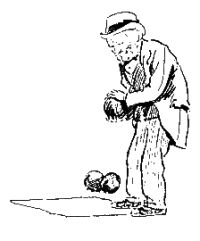
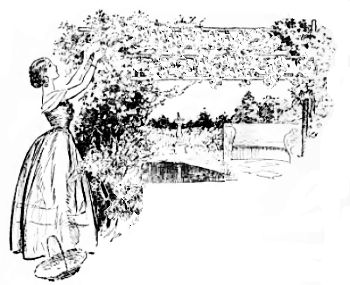
WALKING in the garden in the cool of the July evening, I was struck afresh by the beauty of that climbing rose we call Dorothy Perkins, and by her absolute inability to make a mistake. There are in this garden several of these ramblers, all heritages from an earlier tenant and all very skilfully placed: one over an arch, one around a window, and three or four clambering up fir posts on which the stumps of boughs remain; and in every case the rose is flowering more freely than ever before, and has arranged its blossoms, leaves, and branches with an exquisite and impeccable taste. Always lovely, Dorothy Perkins is never so lovely as in the evening, just after the sun has gone, when the green takes on a new sobriety against which her gay and tender pink is gayer and more tender. “Pretty little Dolly Perkins!” I said to myself involuntarily, and instantly, by the law of association—which, I sometimes fondly suppose, is more powerful with me than with many people—I began to think of another evening, twenty and more years ago, when for the first time I heard the most dainty of English comic songs sung as it should be, with the first words of the chorus accentuated like hammer blows in unison:—
She—was—as—
and then tripping merrily into the rest of it:—
—beautiful as a butterfly,
As fair as a queen,
Was pretty little Polly Perkins
Of Paddington Green.
It is given to most of us—not always without a certain wistful regret—to recall the circumstances under which we first heard our favourite songs; and on the evening when I met “Pretty Polly Perkins” I was on a tramp steamer in the Mediterranean, when at last the heat had gone and work was over and we were free to be melodious. My own position on this boat was nominally purser, at a shilling a month, but in reality passenger, or supercargo, spending most of the day either in reading or sleeping. The second engineer, a huge Sussex man, whose favourite theme of conversation with me was the cricket of his county, was, it seemed, famous for this song; and that evening, as we sat on a skylight, he was suddenly withdrawn from a eulogy of the odd ways and deadly left-handers of poor one-eyed “Jumper” Juniper (whom I had known personally, when I was a small schoolboy, in a reverential way) to give the company “Pretty Polly Perkins”. In vain to say that he was busy, talking to me; that he was dry; that he had no voice. “Pretty Polly Perkins” had to be sung, and he struck up without more ado:—
I’m a broken-hearted milkman,
In woe I’m arrayed,
Through keeping the company of
A young servant maid—
and so forth. And then came the chorus, which has this advantage over all other choruses ever written, that the most tuneless singer on earth (such as myself) and the most shamefaced (I am autobiographical again) can help to swell, at any rate, the notable opening of it, and thus ensure the success of the rest.
That evening, as I say, was more than twenty years ago, and I had thought in the interval little enough of the song until the other pretty Perkins suggested it; but I need hardly say that the next day came a further reminder of it (since that is one of the queer rules of life) in the shape of a Chicago weekly paper with the information that America knows “Pretty Polly Perkins” too.
The ballads of a nation for the most part respect their nationality, but now and then there is an exchange of them. It has been so with “Pretty Polly Perkins”; for it seems that, recognising its excellence, an American singer prepared, in 1864, a version to suit his own country, choosing, as it happens, not New York or Washington as the background of the milkman’s love drama, but the home of Transatlantic culture itself, Boston. Paddington Green would, of course, mean nothing to American ears, but Boston is happy in the possession of a Pemberton Square, and Polly was, therefore, made comfortable there, and, as Pretty Polly Perkins of Pemberton Square, became more or less famous. The adapter deserves great credit for altering as little as possible. Beyond Polly’s abode, and the necessary rhymes to mate with Square, he did nothing, so that the song, while transplanted to America, remained racy of the English capital. It was still the broken-hearted milkman who sang it, and the dénouement, which is so very English—and, more than English, Cockney—was unaltered:—
In six months she married,
That hard-hearted girl;
It was not a squire,
And it was not a nearl.
It was not a baronet,
But a shade or two wuss—
’Twas the wulgar old driver
Of a twopenny ’bus.
But the story of Polly is nothing. The merit of the song is its air, the novelty and ingenuity of its chorus, and the praises of Polly which the chorus embodies. The celebration of charming women is never out of date. Some are sung about in the Mediterranean, some in Boston, and some all the world over; others give their names to roses.
So far had I written—and published—in a weekly paper, leaving open a loophole or two for kind and well-instructed readers to come to my aid; and as usual (for I am very fortunate in these matters) they did so. Before I was a month older I knew all. I knew that the author, composer, and singer of “Pretty Polly Perkins of Paddington Green” were one and the same: the famous Harry Clifton; and that Polly married “not the wulgar old driver” of a twopenny ’bus, as was my mistaken belief, but quite the reverse—that is to say, the “bandy-legged conductor” of the same vehicle. A gentleman in Ireland was even so obliging as to send me another published ballad by Harry Clifton, on the front of which is his portrait and on the back a list of his triumphs—and they make very startling reading, at any rate to me, who have never been versatile. The number of songs alone is startling: no fewer than thirty to which he had also put the music and over fifty to which the music was composed by others, but which he sang no doubt with acceptance. Judging by the titles and the first lines, which in the advertisement are always given, these songs of the sixties were very much better things than most of the songs of our enlightened day. They seem to have had character, a humorous sententiousness, and a genial view of life. And judging by his portrait on the cover, Harry Clifton was a kindly, honest type of man, to whom such aids to the modern comic singer’s success as the well-advertised membership of a night club or choice of an expensive restaurant were a superfluity.
Having read these letters and the list of songs, I called on a friend who was at that moment lying on a bed of sickness, from which, alas! he never rose—the late George Bull, the drollest raconteur in London, and one of the best of men, who, so far as I am concerned, carried away with him an irreplaceable portion of the good humour of life; and I found that the name of Harry Clifton touched more than one chord. He had heard Harry Clifton sing. As a child, music-halls were barred to him, but Harry Clifton, it seems, was so humane and well-grounded—his fundamentals, as Dr. Johnson would say, were so sound—that he sang also at Assembly Rooms, and there my friend was taken, in his tender years, by his father, to hear him. There he heard the good fellow, who was conspicuously jolly and most cordially Irish, sing several of his great hits, and in particular “A Motto for Every Man,” “Paddle Your Own Canoe,” and “Lannigan’s Ball” (set to a most admirable jig tune which has become a classic), one phrase from which was adopted into the Irish vernacular as a saying: “Just in time for Lannigan’s ball”. Clifton might indeed be called the Tom Moore of his day, with as large a public, although not quite so illigant a one. For where Moore warbled to the ladies, Clifton sang to the people. Such a ballad as that extolling the mare of Pat of Mullingar must have gone straight to the hearts of the countrymen of Mr. Flurry Knox:—
They may talk of flying Childers,
And the speed of Harkaway,
Till the fancy it bewilders
As you list to what they say.
But for rale blood and beauty,
You may travel near and far—
The fastest mare you’ll find belongs
To Pat of Mullingar.
An old lady in Dublin who remembers Clifton singing this song tells me that the chorus, “So we’ll trot along O,” was so descriptive, both in words and music, that one had from it all the sensations of a “joult”.
Harry Clifton seems to have had three distinct lines as an entertainer—the comic song, of which “Pretty Polly Perkins” may be considered the best example; the characteristically Irish song; and the Motto song, inculcating a sweet reasonableness and content amid life’s many trials and tribulations. Although, no doubt, such optimism was somewhat facile, it cannot be denied that a little dose of silver-lining advice, artfully concealed in the jam of a good tune and a humorous twist of words, does no harm, and may have a beneficial effect. The chorus of “A Motto for Every Man,” for example, runs thus:—
We cannot all fight in this battle of life,
The weak must go to the wall.
So do to each other the thing that is right,
For there’s room in this world for us all.
An easy sentiment: but sufficient people in the sixties were attracted by it to flock to hear Harry Clifton all over England and Ireland, and it is probable that most came away with momentarily expanded bosoms, and a few were stimulated to follow its precepts.
Looking down this remarkable list of titles and first lines—which may be only a small portion of Harry Clifton’s output—I am struck by his cleanliness and sanity. His record was one of which he might well be proud, and I think that old Fletcher of Saltoun, who had views on the makers of a nation’s ballads, would probably have clapped him on the back.
Another thing. If many of the tunes to these songs are as good as that to “Polly Perkins,” Harry Clifton’s golden treasury should be worth mining. The songs of yesterday, when revived, strike one as being very antiquated, and the songs of the day before yesterday also rarely bear the test; but what of the songs of the sixties? Might their melodies not strike freshly and alluringly on the ear to-day? Another, and to-day a better known, Harry—Harry Lauder—whose tunes are always good, has confided to an interviewer that he finds them for the most part in old traditional collections, and gives them new life. He is wise. The arrival of the luckless day when the combinations of the notes of music are all used up would, at any rate, be delayed if we revived tunes that were old enough for that process; and why should not the works of Harry Clifton be examined for the purpose? But perhaps they have been. . . .
And then we come back to the marvel, to me, of the man’s variousness. I can plead guilty to having written the words of a dozen songs or so in as many years, but to put two notes of music together is beyond me, and to sing anything in tune would be an impossibility, even if I had the assurance to stand up in public for that purpose. Yet Harry Clifton, who, in the picture on the cover of the song which the gentleman in Ireland sent me, does not look at all like some brazen lion comiques, not only could sing acceptably, but write good words and good music. I hope he grew prosperous, although there is some evidence that his native geniality was also a stumbling-block. Your jolly good fellows so often are the victims of their jolly goodness.
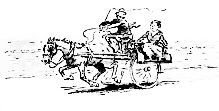
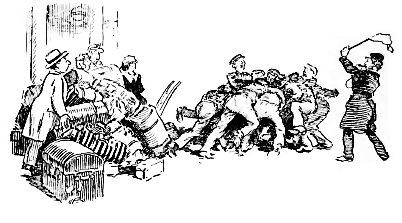
I HAVE met her at last.
For years I have been searching for her in vain; and yet I knew that she must be somewhere.
She is in service in a hotel. I should like to give the name of the hotel, but such things are not done. There are journalistic conventions which such divulgence would fracture. But I can throw lights, as the acrostic people do. I can tell you that there is an engraving after Landseer on one of the walls. But perhaps that is not enough. Very well, then, I can say that the hotel is situated in a town in a county which gives a certain illustrious young man and people’s darling the title of duke. It is situated in a town with a harbour at whose entrance are relics of saints, and among whose most constant yachtsmen is an artist who has more than once sent to the Royal Academy a painting of boys bathing and drying in the sun. This town is an incredible distance from London, in an easterly direction I don’t think. An old song once said of it that it was a fine town, with ships in the bay; and it is, although when I was there one of the ships in that bay was a wreck, heeling over on the rocks, a pitiful sight.
Perhaps I have thrown lights enough? As to the hotel itself, mum must be the word. Consider me eager to impart the information, but restrained by worldly guile.
My discovery of the marvellous creature was only one of a series of remarkable events that have marked the opening of this holiday. For as I reached the London terminus at which the train starts, something occurred so untoward as, in a more superstitious nature than my own, to implant every kind of misgiving and possibly cause me to abandon my enterprise. In the Middle Ages I am sure it would have been a portent of doom not to be disregarded.
The cab had drawn up at the footway by the booking-office, and various porters were moving towards me, when suddenly, as though at a preconcerted signal, every one of them let their barrows go and turned and ran in another direction. At first I thought that a new lightning strike had set in; but no, for once that was a mistake: all that had happened was that a rat had been so ill-advised as to make its appearance and must now be hunted to its end.
How, in the dusk of the evening, its form could be so quickly detected and the glad news so instantaneously spread I cannot explain, except by reference to the exercise of an extra sense which the pursuit of four-footed animals can evoke in the two-footed; but the fact remains that the chase was in a few seconds universal. Up and down the pavement fled the rat; up and down scuttled the men, with no weapons but boots with which to kick at the terrified creature, for a long time in vain, while their shouts and clamour filled the air.
At last the rat was cornered and despatched and the perplexed passengers and their luggage had a chance. “Is this,” I asked the flushed and triumphant sportsman who now consented to attend on me, “a common occurrence?”
“Never saw one here before,” he said.
But if I were a director of that line I should see that his eyes were often thus gratified. The life of a porter is, I am sure, marked by but little fun, and no one need be surprised if discontent is theirs; but there would be less, if any, of it if those in authority took a leaf out of the Book of Chance and now and then provided by design such a diversion as caprice had just furnished. Wages £5 a week, all the tips you can collect, and a rat hunt once a week.
You see that this holiday was destined to be marked by strange happenings!
But what is a rat hunt on a London terminus pavement compared with the phenomenon of which I started to tell?
For in the hotel where I was staying there was a chambermaid who, after she had brought the hot water in the morning, went back to the door again, stooped, and brought in my shoes.
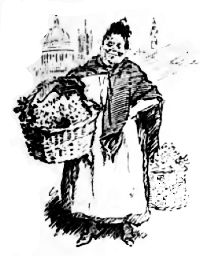
“HOW much is this bunch?” I asked of the flower-woman at the corner.
“A shilling,” she replied, “but you can have it for sixpence. I hate the sight of it.”
Now here was an oddity in a world of self-centred, acquisitive tradespeople: a dealer who decried her own wares. Obviously flower-women can have temperaments.
I asked her what there was about palm, as we call those branches of willow with the fluffy, downy buds on them, that so annoyed her.
“It’s such stupid stuff,” she explained. “I can understand people buying daffodils or tulips or violets, because they’re pretty or sweet, but not this dried-up stuff with the little kittens.”
The remark set me wondering to what extent dealers in other articles are perplexed by their customers’ preferences. (Some milliners, I hope.) For the most part we are encouraged by the shopkeeper to follow our own inclinations. His taste may be utterly different, but he doesn’t impose it on us; he ventures to suggest only when there are varying prices and we seem unduly disposed to the lowest. But this old lady was prepared, long before the bargaining stage had set in, to knock off fifty per cent. and traduce the goods as well. Surely a character.
“And that’s not all,” she added. “What do you think a lady—calls herself a lady—said to me just now when she bought threepennyworth? She said it lasted a year. Fancy telling a poor flower-woman that!”
We went on to talk of her calling. I found her an “agreeable blend” (as the tobacconists say) of humour and resignation; and very practical.
“Why are your flowers,” I asked her, “so much better than the flowers of the man the other side of the road?”
“Because he takes his home at night,” she said. “You should never do that. If I’ve got any unsold, I leave them at the fire-station and then they’re fresh in the morning. But I don’t often have any left over.”
This was, I should say, a day of acute discomfort; it had been bitterly raining since early morning, and yet there was no bitterness in her. She was merely resigned. Very wet, but cheerfully apathetic. “When it’s cold and wet like this,” I asked, “is life worth living?”
“Of course,” was her splendid answer; “aren’t there the nights?”
Rather fine that—even if as a commentary on the wakeful hours a little acid. And for those who can sleep, how true! “Aren’t there the nights?” I must remember the solace when next the cynic or the misanthrope girds at sunless noons.
Of her philosophy she then gave me another taste, for, observing a great mass of loose coins, many of them silver, lying in the basket, I asked if she were not afraid of a thief snatching at it. “Oh, no,” she said. “But I don’t always have it there. It’s because it’s so wet to-day. Counting helps.”
My guess would have been that although the life of flower-women calls for philosophy, for philosophy to respond is by no means the rule; and her consolation and cheerfulness made me very happy. Yet what a penance much of their lives must be! First of all, there is the weather. Wet or fine, hot or cold, they must be out in it, and stationary at that. What to place second and third I do not know, but there is the perishable character of the stock-in-trade to be considered, and, when fogs and frosts interfere, the chance of being unable to collect any stock-in-trade at all. But exposure must be the crucial strain.
The whole question of the motionless, receptive attitude to the elements is interesting to me, who catch cold several times a day. How these people can stand it is a constant mystery. That blind man, for instance, at the little door of the Temple just below the Essex Street archway—ever since I can remember London he has been there, with his matches, always serene, no matter what new buffetings Heaven has for him.
The blind in particular seem to become indifferent to climatic extremes; and there must be in every one’s cognisance two or three immovable sightless mendicants defying rain and chill. Every town in the country has such landmarks, and all seem to retain their health. But I recollect that the blind man who used to sit in front of the Grand Hotel at Brighton forty years ago spelling out Holy Writ, while the dog at his feet collected coppers in a little box, always in winter wore mittens and a cap with ear-flaps, and had fingers red and swollen. Still, he endured. Whether with those red and swollen fingers he really deciphered the Evangel or merely repeated from memory, we never knew, but I can still hear the droning voice, “And Jesus said——”
This insensitiveness to January blasts and February drenchings may be one of the compensations that the blind enjoy. Whatever else happens to them they never, perhaps, catch cold. And that immunity, if true, would be more than something.
But how odd that these stolid, shabby, and often rather battered old florists should be the middle-men and middle-women between the country and the city, but for whose indifference to pitiless skies so many town-dwellers would never see a blossom at all! There is nothing of the country about them, nothing of the garden, and yet it is they who form the link between flower-bed and street.
“Well,” I said, grasping the bunch of palm that the old flower-woman had sold me at such a sacrifice, “good-bye; I hope you’ll empty your basket.”
“And I hope you’ll empty yours,” she replied.
“Mine?” I said, “I haven’t got one.”
“Oh, yes, you have,” said Flora: “every one’s got a basket, only they don’t always know where to take it.”
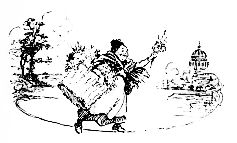
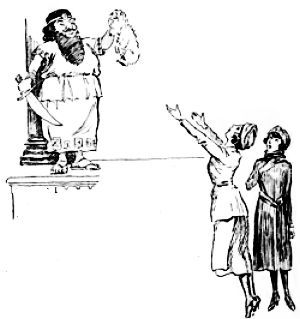
MY hostess and her daughter met me at the station in the little pony-cart and we set off at a gentle trot, conversing as we went. That is to say, they asked questions about London and the great wicked world from which I had just come, and I endeavoured to answer them.
It was high if premature summer; the sky was blue, and the hedges and the grass were growing almost audibly, the birds sang, the sun blazed, and, to lighten the pony’s burden, I walked up two or three hills without the faintest enthusiasm.
Just after the top of the last hill, when I had again resumed my seat (at the risk once more of lifting the pony into the zenith), the ladies simultaneously uttered a shrill cry of dismay.
“Look!” they exclaimed; “there’s Bunty!”
I looked, and beheld in the road before us a small West Highland terrier, as white as a recent ratting foray in a wet ditch would allow.
“Bunty! Bunty! you wicked dog!” they cried; “how dare you go hunting?”
To this question Bunty made no reply, but merely subsided under the hedge, where a little shade was to be had, in an attitude of exhaustion tempered by wariness.
“How very naughty!” said my hostess. “I left her in the house.”
“Yes,” said the daughter, “and if she’s going to go off hunting like this what on earth shall we do? There’ll be complaints from every one. She’s never done it before.”
“Come, Bunty!” said my hostess, in the wheedling tones of dog-owners whose dogs notoriously obey their slightest word. But Bunty sat tight.
“If we drive on perhaps she’ll follow,” said the daughter, and we drove on a few yards; but Bunty did not move.
We stopped again, while coaxing noises were made, calculated to soften the hearts of rocks; but Bunty refused to stir.
“She’ll come on later,” I suggested.
“Oh, no,” said the mother, “we couldn’t risk leaving her here, when she’s never gone off alone before. Bunty! Bunty! don’t be so naughty. Come along, there’s a dear little Bunty.”
But Bunty merely glittered at us through her white-hair entanglement and remained perfectly still.
Strange dogs are not much in my line; but since my hostess was no longer very active, and the daughter was driving, and no one else was present, there seemed to be a certain inevitableness about the proposition which I then made that I should get out and bring the miscreant in.
“Oh, would you mind?” my hostess said. “She won’t bite, I promise you. She’s a perfect dear.”
Trying hard to forget how painful to legs or hands can be the smart closing of the snappy jaws of dogs that won’t bite, I advanced stealthily towards Bunty, murmuring ingratiating words.
When I was quite close she turned over on her back, lifted her paws, and obviously commended her soul to Heaven; and I had therefore no difficulty in lifting her up and carrying her to the trap.
Her mistresses received her with rapture, disguised, but by no means successfully, by reproach and reproof, and we were beginning to drive on again, when an excited voice called upon us to stop, and a strange lady, of the formidable unmarried kind, with a very red face beneath a purple parasol, confronted us.
“What,” she panted, “is the meaning of this outrage? How dare you steal my dog?”
“Your dog, madam?” I began.
“It’s no use denying it,” she burst in, “I saw you do it. I saw you pick it up and carry it to the trap. It’s—it’s monstrous. I shall go to the police about it.”
Meanwhile, it cannot be denied, the dog was showing signs of delight and recognition such as had previously been lacking.
“But——” began my hostess, who is anything but quarrelsome.
“We ought to know our own dog when we see it,” said the daughter, who does not disdain a fight.
“Certainly,” said the angry lady, “if you have a dog of your own.”
“Of course we have,” said the daughter; “we have a West Highland, named Bunty.”
“This happens to be my West Highland, named Wendy,” said the lady, “as you will see if you look on the collar. My name is there too—Miss Morrison, 14 Park Terrace, W. I am staying at Well House Farm.”
And it was so.
It was on the tip of my tongue to point out that collars, being easily exchangeable, are not evidence; but I thought it better that any such suggestion should come from elsewhere.
“It is certainly very curious,” said the daughter, submitting the features of the dog to the minutest scrutiny; “if it is not Bunty it is her absolute double.”
“It is not Bunty, but Wendy,” said Miss Morrison coldly; “and I shall be glad if you will give her to me.”
“But——” the daughter began.
In the regrettable absence of Solomon, who would, of course, have ordered the little devil to be cut in two, there was nothing for it but to surrender; and the couple went off together, the dog exhibiting every sign of pleasure.
Meanwhile the daughter whipped up the pony, and, silent and perplexed, we soon entered the gates.
In the drive, awaiting us, was a West Highland terrier, named Bunty.
“There!” cried the ladies, as they scrambled out and flung themselves on her.
“Of course, she’s not a bit like that Wendy thing really,” said the mother.
“Now that I come to look at her I can see heaps of difference,” said the daughter.
“None the less,” I interjected, “you turned a very honest man into a thief, and a dog-thief at that; and he insists on reparation.”
“Yes, indeed,” said the mother, “it is really too bad. What reparation can we make?”
I don’t pretend that my feelings are completely soothed, but the Clicquot 1904 which took the place of claret at dinner that evening was certainly very good.
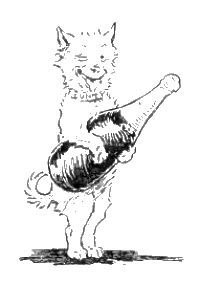
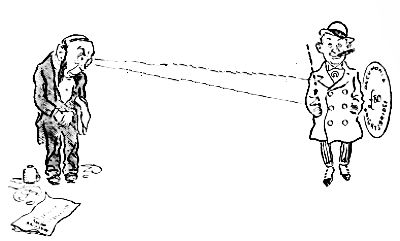
THERE must be few minor agonies more disturbing than the presence of a constant suspicion which no amount of investigation can ever confirm or disperse.
And when a matter of eighty Fishers is concerned, why, then . . . .
On the assumption that everyone now bets on horses, I have latterly opened all casual conversations in street and tram, office and ’bus, lift and cloak-room, with the remark, “I hope you backed So-and-so?”—or whatever outsider it was that had most recently upset all the form and the prophets and won at long odds—and in ninety-nine cases out of a hundred the answer indicated that, although that most desirable proceeding was not indulged in, money had been invested on one or more runners.
The honour of being the hundredth man fell to the old waiter at a certain chop-house.
No, he said, he hadn’t backed So-and-so or anyone else. Because he didn’t hold with betting. A mug’s game. He’d never had but one bet, and that was enough for him. Too much, in fact, for it had poisoned his life.
“Poisoned?” I repeated.
“Yes,” he said, “poisoned. It was like this: I never took any interest in racing, except now and then to be barged into and very nearly knocked down and most likely killed by newspaper boys rushing about with the winner of the three-thirty, till one day a customer here—a nice affable gent too—when the time came to pay hadn’t a brown left for me, so he said, ‘I can’t give you any money, Robert, but I’ll give you a tip of a better kind. To-morrow there’s a double that’s a cert—Pneumonia and Knightsbridge.’ You know what a double is? Both horses have to win or you don’t get anything; but if both win you get a packet.
“As I knew nothing about racing I went to a pal who was going to the races and handed him a sovereign, for, ‘If I am going to gamble,’ I said, ‘I’ll do it proper. Put that on Pneumonia and Knightsbridge for the double,’ I said. ‘Right-o,’ he said. ‘Don’t forget,’ I said. ‘Not arf,’ he said, and then I went home to bed.
“But I couldn’t sleep for thinking about those two horses. And all next day I was like a maniac. Every time I heard a paper-boy my heart turned right over. At lunch I got all the orders wrong. I served mulligatawny instead of custard, and if I broke one plate I broke twenty. My hand was like a shuttle. And then at last I got a paper with the first of my races in it, and found that Pneumonia had won at 10 to 1. I could hardly stand up.
“Half the double had come home, and all I had to do now was to win the other half and then I’d be a millionaire—a Solly Joel and Harry Lauder rolled into one—for that’s what all that money would mean to me.
“Well, my second race wasn’t till late, and how I got through that afternoon I don’t know. And then when I had bought a paper I didn’t dare to look at it. It cost me eighteenpence for brandy before I could bring my eyes to the print, and there, sure enough, Knightsbridge had won too, at 8 to 1. Just think of it, 10 to 1 and 8 to 1—that was eighty-eight pounds to me, because they add the first quid on. No one knows how I felt. I was just like a baby—I laughed and cried both together. I thought of all the things I’d buy. I was mad with joy.”
He stopped and gulped.
“And then in walks my pal and hands me a sovereign. ‘I’m really very sorry,’ says he, ‘but I quite forgot to put it on for you.’
“Well, I hope I’ll never have another shock like that. In fact, I couldn’t stand another. Another would do me in.
“ ‘You forgot it?’ I said, when I came to. ‘Yes,’ he said, ‘I’m very sorry. I forgot it.’
“And to this day I don’t know whether he did or not. That’s what I meant by poisoning life. Whenever I meet him I look him in the eye and wonder and wonder. ‘Did you have eighty of the best off me, or didn’t you?’ I says to myself, staring at him X-ray like. But I shall never know. Is he my friend, or is he a wrong ’un? I shall never know. Isn’t that poisoning life?”
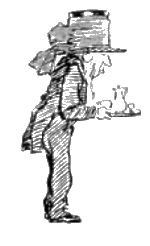
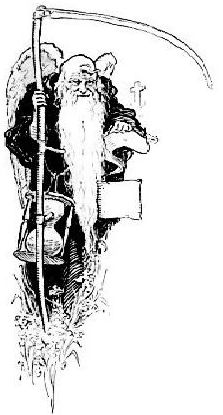
NOT long ago I was staying in a village where the shortest cut to the inn lay through the churchyard, and passing and repassing so often I came to know the dead inhabitants of the place almost better than the living. Not with the penetrating knowledge of the author of Spoon River Anthology—that very extraordinary and understanding book,—but in a kindly superficial way. Indeed, considering that they were total strangers and their acquaintance was not now to be made by any but the followers of those doughty knights of the round (or square) séance table, Sir Oliver and Sir Conan, some of these dead people were absurdly often in my thoughts; but that was because of their names. Such names! Many of course were no longer legible, for Father Time had either obliterated them with his patient finger, dipped now in lichen and now in moss, or upon them his tears had fallen too steadily. But many remained, and some of them were wonderful.
Has it ever been explained why the dead have more remarkable names than the living? Did any one ever meet “in the form” a Lavender Wiseways? Yet there was a Lavender Wiseways lying beneath one of those stones. There was her sister too, lying close beside—Lavinia Wiseways. Neither had married; but then how could they have performed a deed which thereby lost them such distinction! Some day I must make inquiries into the surrender of beautiful names—their exchange for common ones—which marriage can involve. And who now on market mornings passes the time of day with a gaitered gentleman named Paradine Ebb? Yet once there was a Paradine Ebb, farmer, not such a great distance from London, to shake by the hand, and chat to, and buy fat stock from, and, I hope, share a cordial glass with. And who—but if I continue I shall betray the village’s name and that is against good manners. Too many real names get into print in these inquisitive days.
It was not, however, of strange dead names that I was thinking when I took up my pen, but of the epitaphs on the tombstones, sometimes so brief and simple, sometimes so long and pompous, and almost always withholding everything of real importance about the occupants of the narrow cells beneath and almost always affecting to despise the precious gift of life. Why should not some one, greatly daring, go so far as to bid the mason engrave a tribute to the world that is being left behind? Would that be so impious? There is no indication that any of these dead ever, when alive, had a moment’s enjoyment. Something like this, for instance:—
Here Lies
HENRY ROBINSON
Who lived in the belief—and,
with many failures, did his
best to act up to it—that if
you spend your time in trying
to be happy and make things
jollier in this world, the next
can take care of itself.
The whole insincere suggestion of most churchyards now is that life has been spent in a vale of tears: a long tribulation, merely a preparation for another and better existence. But we know that that is not usually the case, and we know that many lives, although unrelated to graveyard ideas of decorum and insurance, are happier than not. There is in the God’s Acre of which I am writing more than one appeal to the living to be wary of earthly serenity: surely a very unfair line for the dead to take, and not unremindful of the fable of the fox and his tail. An elaborate stone close by the entrance has a series of dreary couplets warning the passer-by that the next grave to be dug may be his; and on the assumption that he is being too happy he is adjured to a morbid thoughtfulness. The dead might be kinder than that, more generous, more altruistic! I should like a lych gate to bear some such motto as
“Die and Let Live.”
But not only do the epitaphs suggest that life below is a snare; they are by no means too encouraging about the life above. The spirit they proclaim is a very poor one. Nothing can make death attractive; even if some golden-mouthed advocate should arise whose eloquence half persuaded, the churchyard would beat him. The damp of it, the gloom of it, the mouldiness of it, the pathetic unconvincing efforts at resignation which the slabs record! We ought to be braver; more heartening to others. A rector who allowed none but cheerful epitaphs would be worth his tithes.
Would there be any very impossible impropriety in such an inscription as this:—
Here Lies
JOHN SMITH
Who found earth pleasant and
rejoiced in its beauties and
enjoyed its savours; who
loved and was loved; and
who would fain go on living.
He died reluctantly, but
wishes well to all who survive
him.
Carpe Diem.
Reading that, the stranger would not necessarily (I hope) be transformed into a detrimental Hedonist.
And now and then a human foible might be recorded by the stonemason without risk of undermining society’s foundations. When our friends are dead why should we not disclose a little? Some secrets are better out. Here for example:—
Here Lies
(in no expectation of immortality)
THOMAS BROWN
He was no friend of the Church
but he interfered with none of
his neighbours, and his word was
his bond.
What would happen if Thomas Brown’s friends paid for such lapidary style as that? Would the world totter? Again:—
Here Lies
MARY JONES
The wife of William Jones.
Honour her memory, for she
was lenient when her husband
was in liquor.
I should also like to see memorial verses beginning—
Physicians sore
Long time I bore.
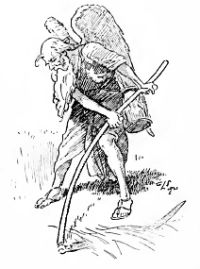
NOTE
The essays, “The Ring,” “The Free Pleasures,” “Transformation,” “Romance while you Wait,” “The Cabman and the Coin,” “Concerning Rarities,” and “The Double,” are here printed in volume-form for the first time. The remainder have been chosen from books already published.
E. V. L.
August, 1921
PRINTED IN GREAT BRITAIN AT THE UNIVERSITY PRESS, ABERDEEN
TRANSCRIBER NOTES
Misspelled words and printer errors have been corrected. Where multiple spellings occur, majority use has been employed.
Punctuation has been maintained except where obvious printer errors occur.
Some illustrations were moved to facilitate page layout.
[The end of Urbanities: Essays New and Old by E. V. (Edward Vevrall) Lucas]